
A beginner’s guide to SEO for real estate investors
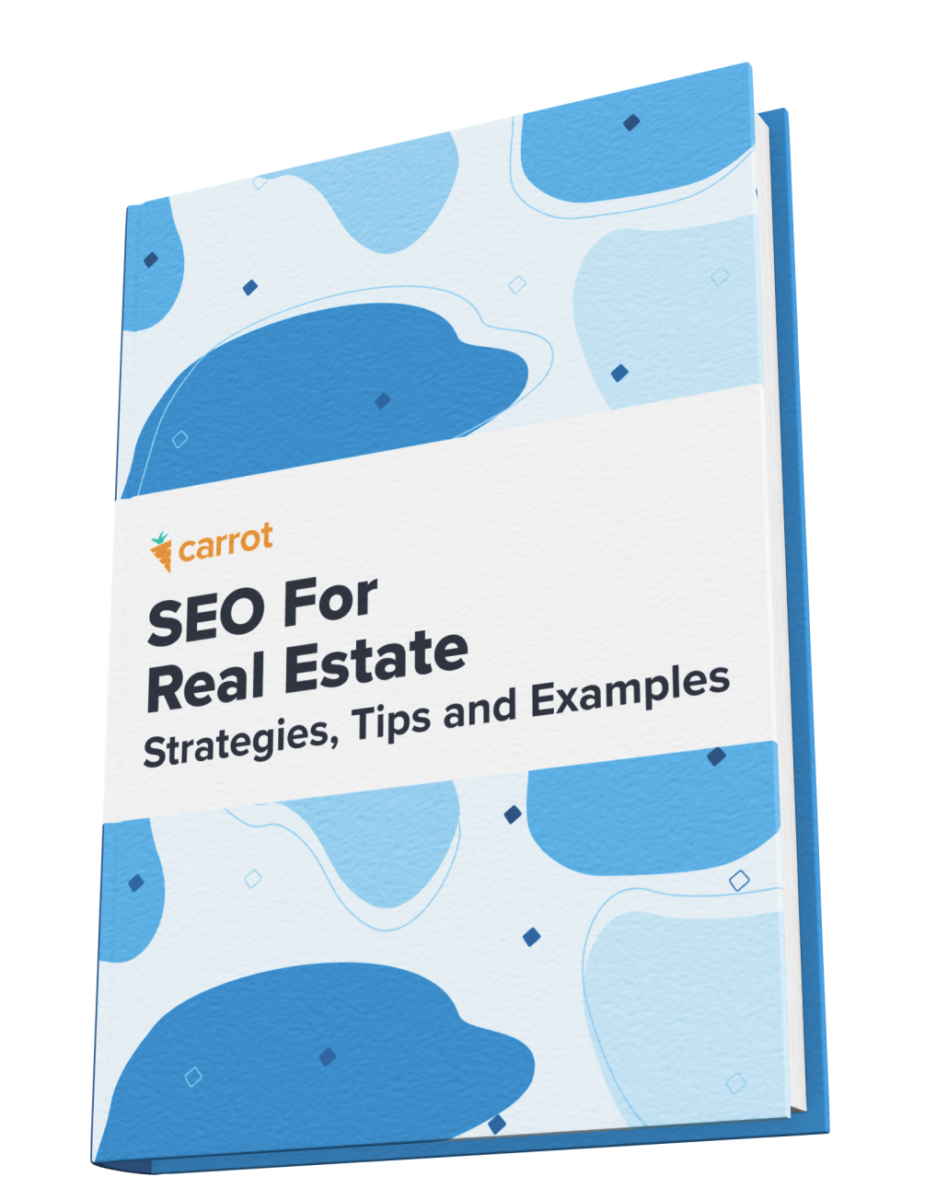
If you’re a real estate agent or investor looking to work with more clients, it’s time to start investing in SEO for real estate. By optimizing your website and content for search engines, you can attract more qualified leads, improve your online visibility, and ultimately grow your business.

Real Estate SEO Bible: The Ultimate SEO Keywords Guide
Download NowSEO for real estate ensures that your website ranks higher when potential clients search for homes or investment properties, giving you an edge over the competition and helping you connect with more motivated buyers and sellers.
According to Google’s Keyword Planner, there were 12,000 monthly searches for “sell my house fast,” 1,900 for “realtors in my area,” and 27,100 for “how to buy a house.” That’s a lot of potential clients searching for solutions to their problems.
By spending a little time per week creating and optimizing content and using keywords wisely, agents can rank themselves highly enough without additional paid marketing efforts!
That means they’ll be able to do 2-3 deals MORE deals per month while, eventually, only doing half as much work.
How much additional revenue would that mean for your business?
If you average $5,000 to $10,000 per deal, 2-3 extra deals mean $10,000 and $30,000 monthly!
SEO has a 6% conversion rate and drives over 13,000 leads monthly…
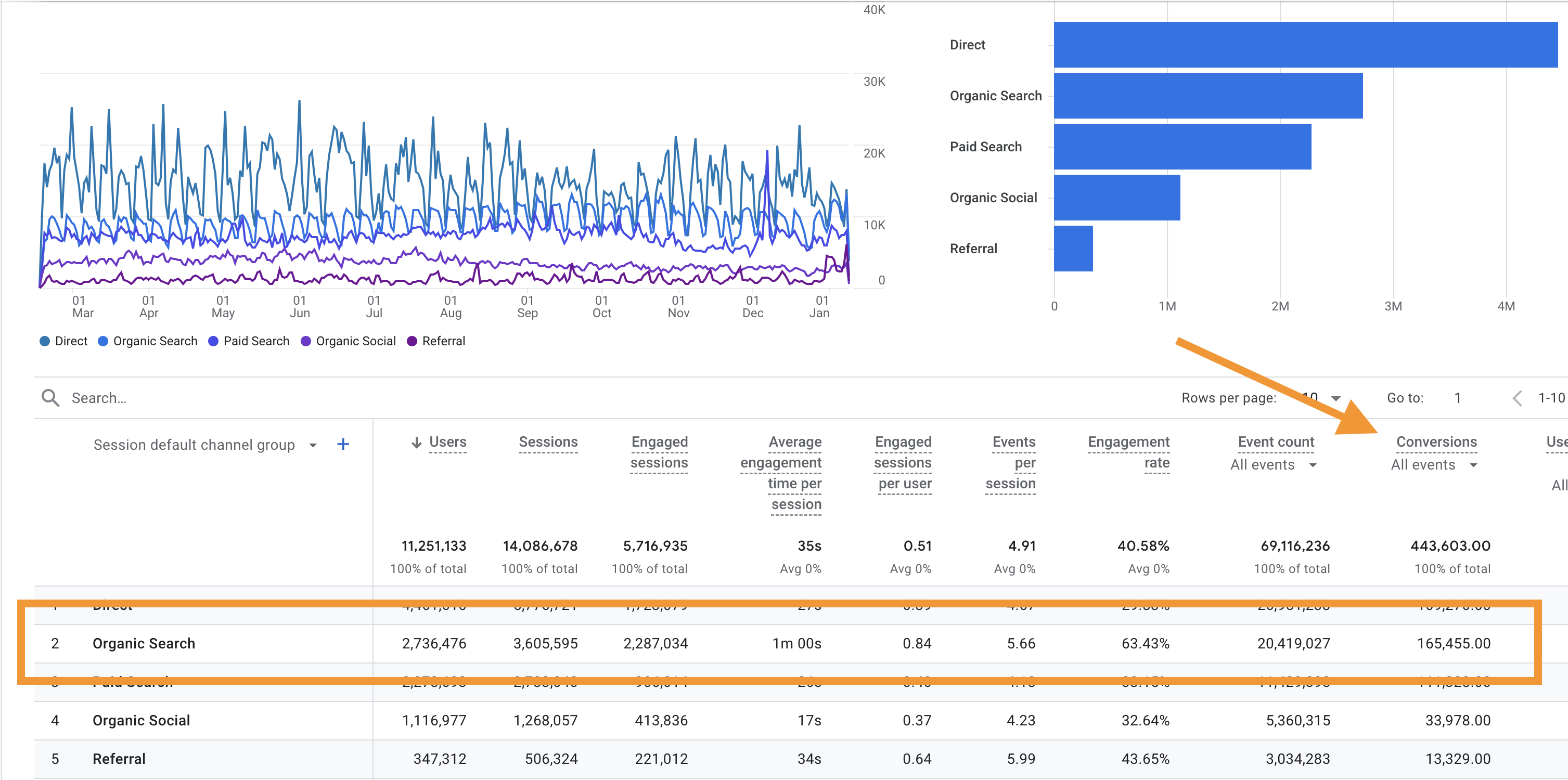
Real estate SEO is perhaps the most powerful (and underrated) marketing strategy to drive traffic to your real estate website. Thousands of Carrot members use Search Engine Optimization to generate passive traffic to their websites (i.e., free traffic) — and not just any traffic. SEO traffic is almost always higher quality than paid traffic.
We believe every real estate website needs SEO to maximize success.

Guide to Real Estate SEO
Strategies, Tips & Examples
Tyler Ford — a real estate investor and agent in Tucson, Arizona — made $200,000 just four months after joining Carrot, focusing on SEO (before that, his business was $20,000 in the hole).
Talking about the quality of leads from organic search traffic, he told us:

“For the most part, they’re all motivated. 80% of the leads that come in are motivated sellers. You send out direct mail, and you’re dealing with 90% of those who are unmotivated. SEO is the exact opposite. They’re chasing you; you’re not chasing them.”
And that illustrates why SEO is so powerful for real estate. It doesn’t just drive traffic to your website consistently; it drives high-quality traffic.
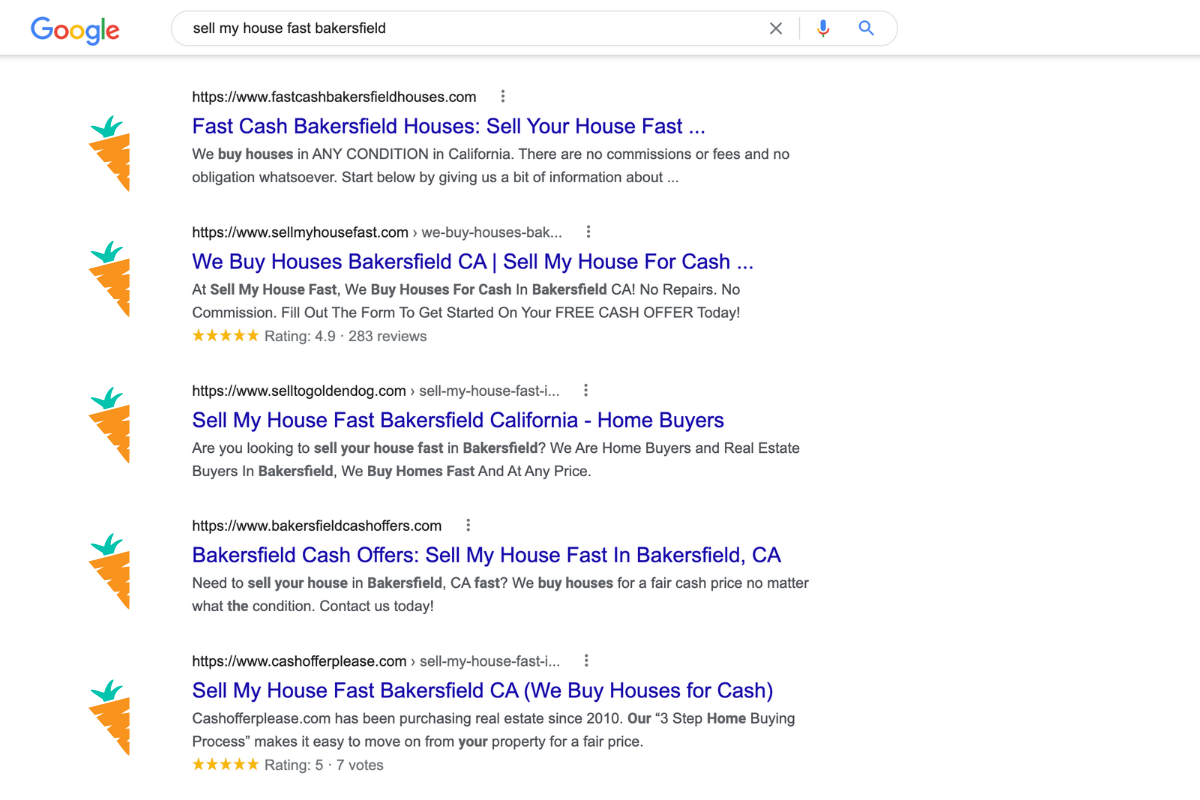
Why is SEO Critical for Real Estate Agents and Investors?
SEO is inbound marketing, meaning your target market finds you rather than you find them.
How amazing would it be if YOUR TARGET MARKET was consistently visiting your website, giving you their contact information, and asking you to contact them to either sell or buy a home? All without you having to spend a single penny on paid ads?
Amazing, huh?
That dream is a reality for real estate investors and agents who focus on building their website’s SEO — they’re generating passive traffic, motivated leads, and closing more deals than their competitors.
SEO is a surefire way to beat the competition, grow your business, and create predictable income and lead generation.
Free Download: The Most Effective SEO Keywords for Real Estate
Chapter 1:
Why SEO Is Important for Real Estate
SEO for real estate involves earning targeted website traffic from a search engine’s organic rankings. This involves creating high-value content, optimizing content for specific keywords, and building backlinks.
SEO is about improving your website’s rankings in the organic section of the search results.
Whether buying multi-family units or looking for traditional sellers, cash buyers, private lenders, or note sellers, you need to understand search engine optimization and how it can improve your business.
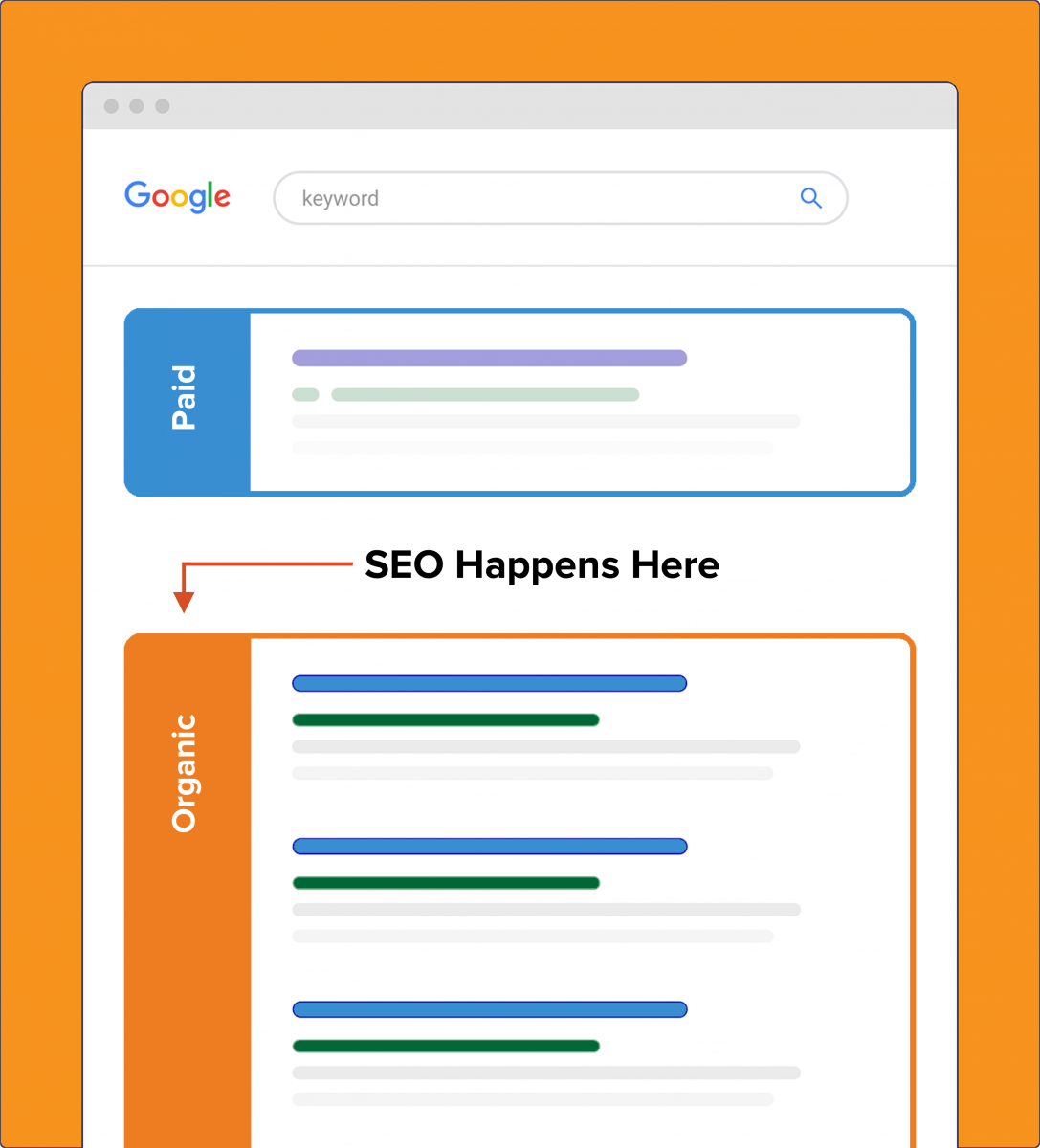
Why Is SEO Crucial for Generating Real Estate Leads?
The first 10 search engine results get the clicks. 75% of searchers never scroll past the first page!
According to recent data, 93% of home buyers use Google as their primary source of information during the home-buying process. Furthermore, a study by the National Association of Realtors (NAR) found that 44% of new home buyers begin their search online.
These statistics highlight SEO’s crucial role in generating real estate leads. By optimizing your websites for, you can increase their visibility and reach more potential buyers, leading to more successful lead generation and sales.
You lose tens of thousands of dollars if you’re not on page one.
Few people click “next page” when searching… they never even see Page 2, never mind pages 4-9.
How Search Engines Work
Search engines are like libraries. They store web pages instead of filling shelves with books.
When you type a query into a search engine, the engine looks through all the pages in its index and tries to return the most relevant results for you. To do this, they use an algorithm. Algorithms are a black box, but Google gives clues.
Here’s what they say on their “Google Search works” page:
“These ranking systems are made up of not one, but a whole series of algorithms. To give you the most helpful information, Search algorithms look at many factors, including the words of your query, relevance, the usability of pages, sources’ expertise, and location and settings.
The weight applied to each factor varies depending on the nature of your query. For example, the freshness of the content plays a bigger role in answering queries about current news topics than it does about dictionary definitions.”
Google is the most used search engine, at least for web searches. But there are many other search engines worth pursuing, like Bing.
Search Engine Ranking Factors
You may know that Google uses 200 plus ranking factors in its algorithm.
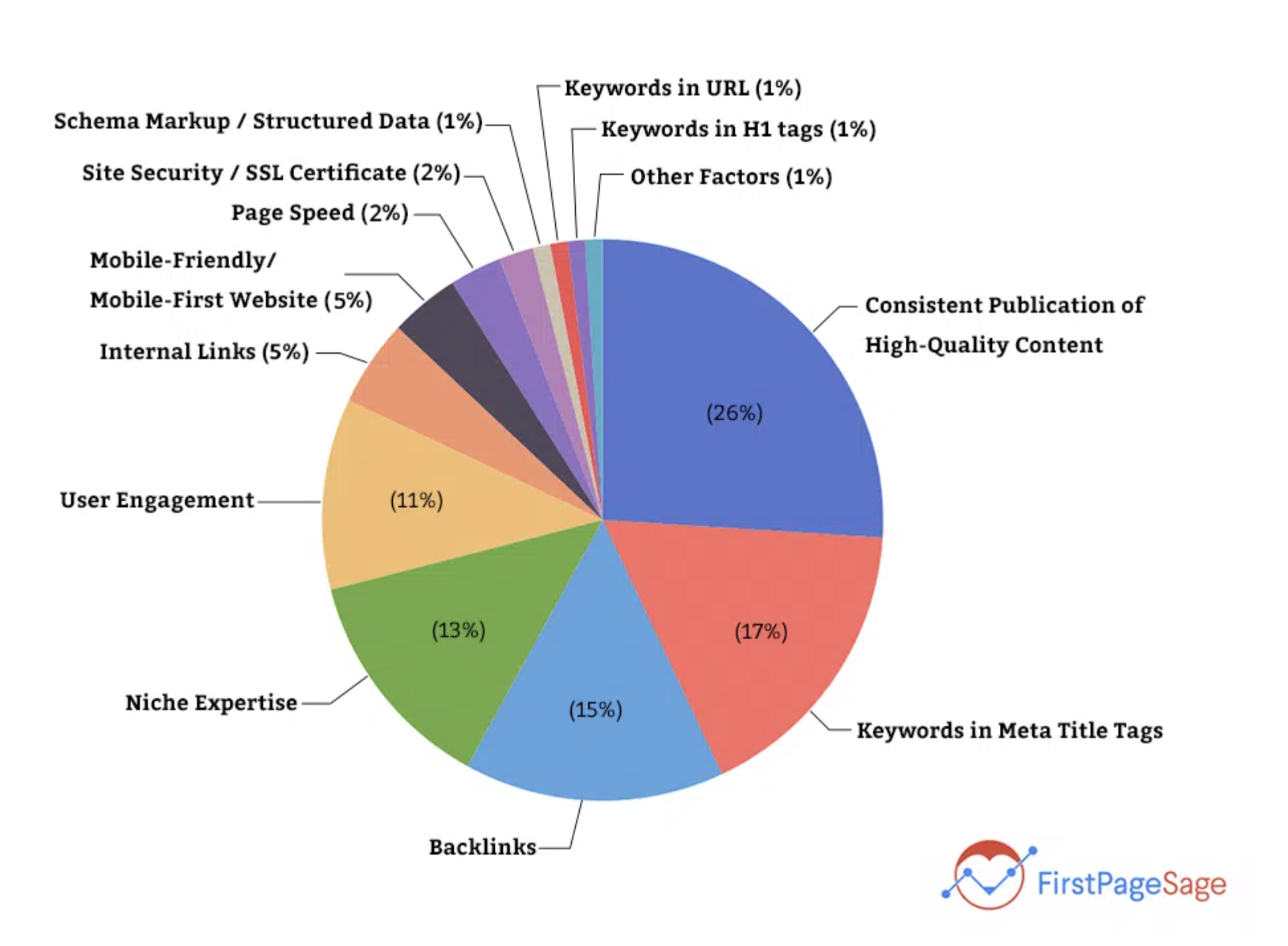
Don’t let that intimidate you. You don’t need to master all 200 plus to be successful. You’re better off learning the small ranking factors that impact most significantly. With just a little SEO knowledge, anyone can start building their rankings.
Of course, if you want to become a market leader, you’ll either need to learn how search engines work, and the factors they’re looking for when ranking content is critical when creating content that ranks for your real estate business or hire an expert with this knowledge.
Search engine algorithms change constantly, so there is no guarantee that what is important now will still be important in the future.
Factors like backlinks, mobile-friendliness, and matching search intent have been critical for many years, but E-E-A-T and technical SEO are becoming more important than ever.
If you want to maintain your rankings after earning them in the first place, staying up to date with the latest best practices is essential.
Chapter 2:
Real Estate Keywords
When we talk about SEO, we’ll often mention “real estate keywords” a lot. You can’t talk about SEO without mentioning keywords.
Keywords are a fundamental part of your SEO strategy. If you don’t target a specific keyword phrase with each page you want to rank in Google, you’re probably not going to rank.
The fact is, you have to tell Google what keyword phrase you’re trying to rank for. The clearer you are about it, the better your chance of reaching page one.
But what exactly is a keyword? And why are they essential for optimizing your website for search engines, driving passive traffic, and generating high-quality leads?
Let’s talk.
What Are Keywords?
Simply put, a keyword is a word or phrase that defines the content on your page or post best. It’s the search term you want to rank for with that specific content.
In SEO, keywords are “keyword phrases” or “search queries.” It can be helpful to think of them this way because keywords are rarely a single word.
When people search for that keyword in Google (or other search engines), they should find that page on your website.
Long-tail keywords are search queries that are very specific and have a relatively low search volume. These keyword phrases usually contain 4-5 words or more.
Although fewer people are searching for long-tail keyword phrases, these keywords are often less competitive and can be easier and quicker to rank for. They tend to attract more qualified traffic that is more likely to convert into leads.
For example, an excellent keyword for real estate agents could be “best time to buy a house.”
Then, write an article with that keyword worked into the title and strategically placed spots within the content.
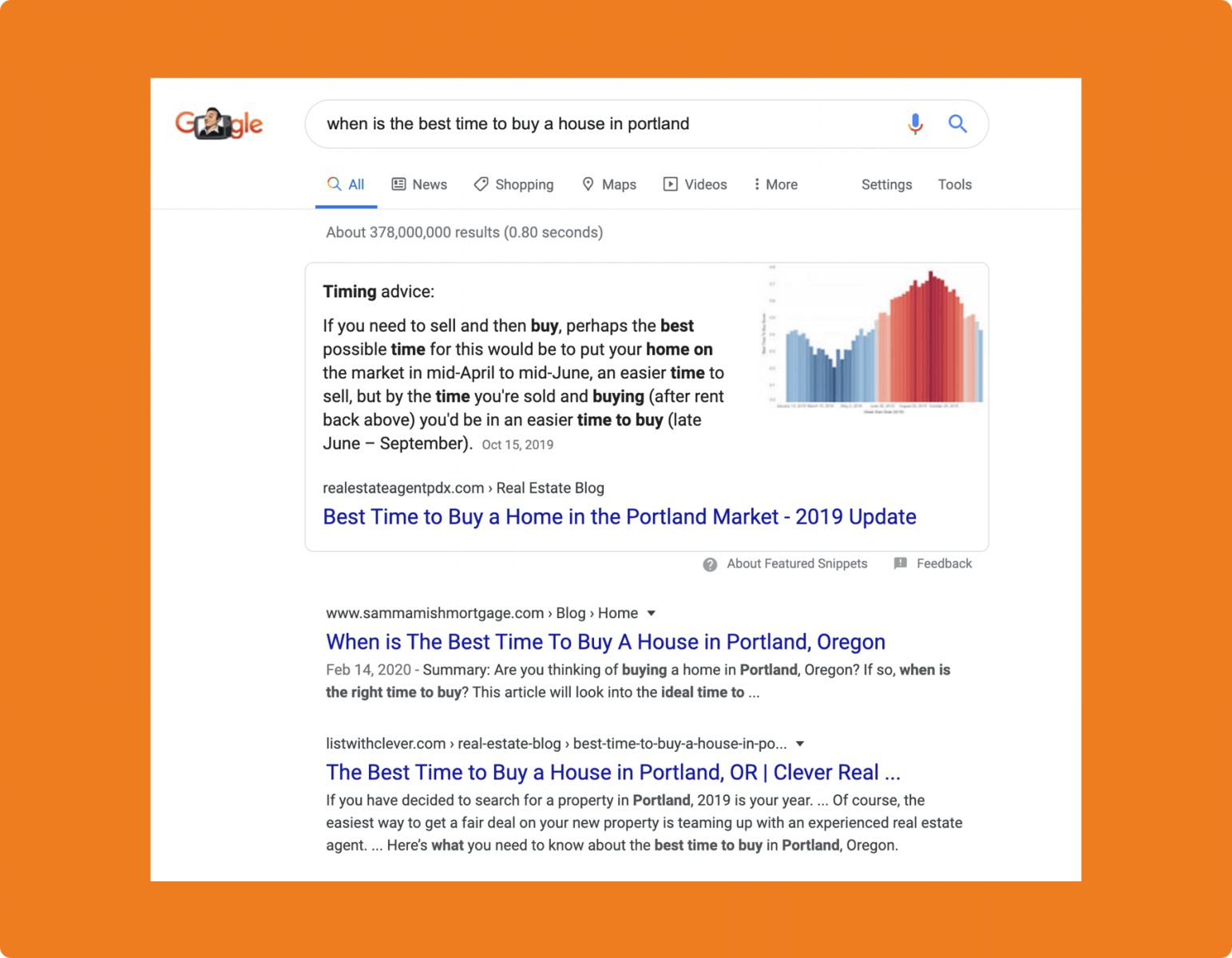
Why is Keyword Research Important?
Organic traffic! Keywords are essential because they are the core connection between what people are searching for and the content you provide to fill that need.
Your goal is to drive organic traffic (non-paid) to your website from the SERPs. The keywords you choose to target with your content will determine the type of traffic you get.
Keywords should be as much about your audience as your content. You might describe what you buy or sell slightly differently than a buyer or seller will ask for it. To create content that ranks high organically and drives visitors to your website, you need to understand the needs of your audience.
How do they talk? What phrases will they use, and what information will they seek? You can communicate with your customers, frequent Facebook forums, visit local community groups, and do keyword research.
How to Find Keyword Ideas for Your Real Estate Website
Keyword research is discovering words and phrases (aka “keywords”) people use in their search.
Keyword research impacts every other SEO task, including finding content topics, on-page SEO, social media, and content promotion.
That’s why keyword research is usually the first part of any SEO campaign.
Put another way, Keywords are like a compass for your SEO campaigns: they tell you where to go and whether you’re progressing.
As a bonus, researching keywords helps you better understand your target audience. That’s because keyword research gives you insight into what customers are searching for… and the exact words and phrases they use. In other words, keyword research is market research for the 21st century.
Guiding Principles
Do’s
- Look at both longtail and short keywords.
- Be mindful of intent – get in the mind of your audience.
- Pay attention to volume and difficulty.
- Be mindful of keyphrase groups.
Don’ts
- Simply go for the highest volume.
- Spread too thin. One high-quality page for a keyphrase family is better than ten shorter pages.
- Don’t go too narrow or too broad.
- Mix intent – someone searching to sell for divorce is not likely looking specific to a city.
Research primary, secondary, and long-tail real estate keywords
First, you need to perform targeted keyword research. You need to look for high-intent, local keywords. Focus on long-tail keywords.
Long-tail keywords are phrases that contain at very least three words. However, we like to see four or five.
They are a great way to target your niche location rather than trying to rank for a more generic term. In other words, they are more specific and often have less competition.
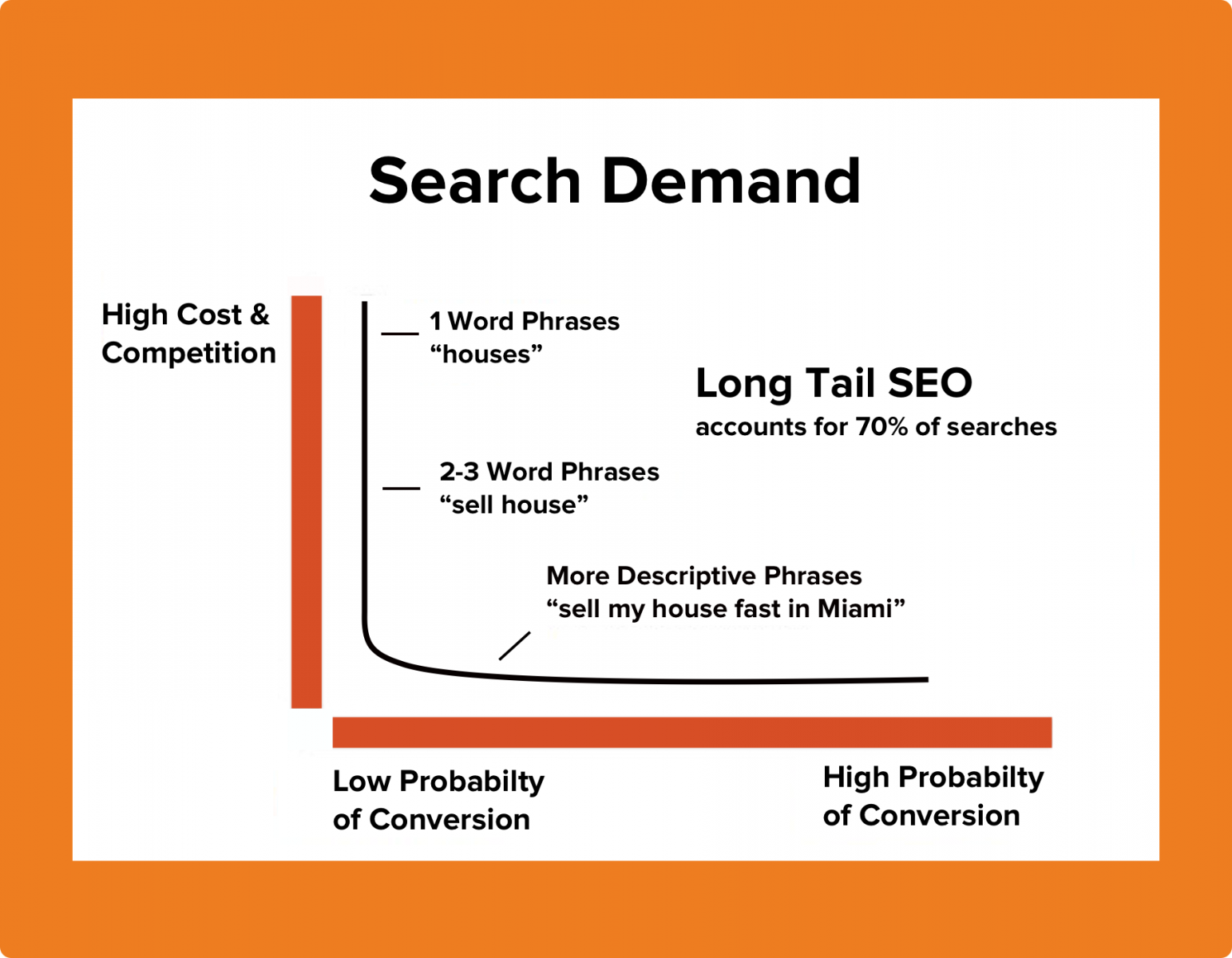
Long-tail keywords will allow you to rank higher in search results for popular niche topics fairly quickly, while you might be trying to rank for harder terms, such as “we buy houses in [market city]. They tend to attract more qualified traffic that is more likely to convert into leads.
Use Google Suggest to Find Keywords
Take advantage of Google Suggestions to find quality real estate terms.
To use Google Suggest, start by typing your primary keyword into the Google search box and see what variations Google suggests:

If phrases turn up in a Google suggestion, you know it is a phrase people are searching for. Some tips might not fit your goal, but they can inspire other search terms you can use in your content.
More Tools to Find Keywords
You can use many tools to help you find the best real estate keywords for SEO. You can use these tools to gather search volume, ranking difficulty, keyword value (if you’re using the keyword for paid traffic), and competition, to name a few.
Here are some of our favorite tools to get you started.
- Ubersuggest is a very easy-to-follow keyword tool. You can see suggestions, volume, estimated paid competition, and estimated competition in organic traffic.
- Ahrefs is a complete platform full of keyword research, content, and SEO+PPC tools.
- Google Ads Keyword Planner (you’ll need a Google Ads account) lets you gather monthly local search volumes for keywords, competition levels, and the estimated cost per click.
- SEMrush provides keyword data. You can use their free tool for a trial period, but beyond, this is a paid tool with many other SEO and PPC research features.
Or, we’ve done the leg work for you. Download our Real Estate Investor and Real Estate Agent keyword bibles…
Free SEO Keyword Bible Download
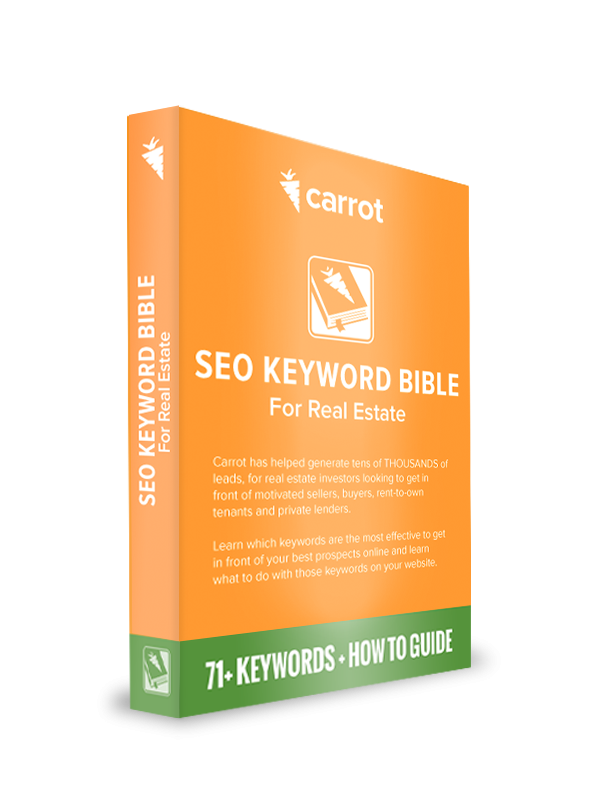
Action Item: Use the tools above to find a long list of keywords to target. At this point, you want to see as many possible keyword phrases.
Chapter 3:
On-Page SEO
What is On-Page SEO?
On-page SEO refers to the measure taken directly within your website to improve its search engine rankings.
On-page SEO for real estate is the best starting place for a new SEO strategy. It focuses on elements you can directly control, making it faster and more effective. Optimizing on-page SEO ranking factors on your website first makes other off-page strategies worthless.
You must start by focusing on your website.
Here are the factors you should pay attention to on each page of your website that you’d like to rank in Google. This is a high-level view of each factor with some action items to wrap up each step.
Why is On-Page Important?
On-page SEO tells Google who you are and gives them the proper information to explain why you should be at the top of the SERPs when your keywords are entered.
Without on-page SEO, your website could be left out. Why leave it to chance?
Giving Google’s algorithm as much information as possible about your real estate website is critical.
However, you don’t want to focus too much on keywords, or you’ll lose some of your user experience. You must optimize your content for bots, but it must also be readable and valuable for your audience.
One way Google knows about what is on your page is by the URL of that particular page.
Guiding Principles
Do’s
- Be mindful that your page is for two audiences: Google and your site visitor. High-quality content works better than keyword stuffing.
- Google is looking for the most relevant answer to the searcher’s question.
Don’ts
- Keyword stuff and not answer your site visitors’ questions.
- Overlook details of meta content/image content.
- Try to rank your site. Google ranks pages.
Google’s EEAT Principle For Content
You might wonder if there’s a clear-cut methodology for creating content that ranks well on Google. Well, we could give you a LOT of advice.
But above everything else, remember EEAT.
Here’s what it stands for.
- Experience
- Expertise
- Authoritativeness
- Trustworthiness
If you nail all of the components in your content, Google will be far more likely to rank you — because Google wants to rank expert content that is authoritative and trustworthy.
Here are some practical ways to improve those three qualities…
- Build Backlinks & Citations
- Keep Content Accurate & Up-To-Date
- Collect Reviews
- Hire Experts to Contribute to Content
- Share Your Credentials
- Share Your Contact Information
Remember these tips whenever you’re creating content. They’ll help you rank higher on Google and drive more traffic to your website.
Chapter 4:
Off-Page SEO
What is Off-Page SEO?
Off-page SEO tactics are actions you can take outside your website to help you rank better in search engine results.
Although we don’t know Google’s full algorithm, off-page SEO factors like backlinks and reviews are believed to carry up to 50% of the ranking factor weight. Algorithms and ranking factors constantly change, but currently, these are significant factors.
Guiding Principles
Do
- Quality vs. quantity of backlinks and citations.
- Create content outside of your website and link back from YouTube.
- Create citations and social profiles.
- Increase your brand presence.
- Publish your reviews outside your website (give a link back)
- Think of all media types – books, podcasts.
- Test and verify efforts.
Don’t
- Buy backlinks from unverified websites.
- Spam forum or blog comment sections.
- Just follow what others are doing. Make a plan and verify quality.
What Are Backlinks?
Backlinks, also known as “inbound links,” link from one website to a page on another website. Google considers backlinks “votes” for a specific page.
Pages with high-quality backlinks tend to rank higher in organic search engine results.
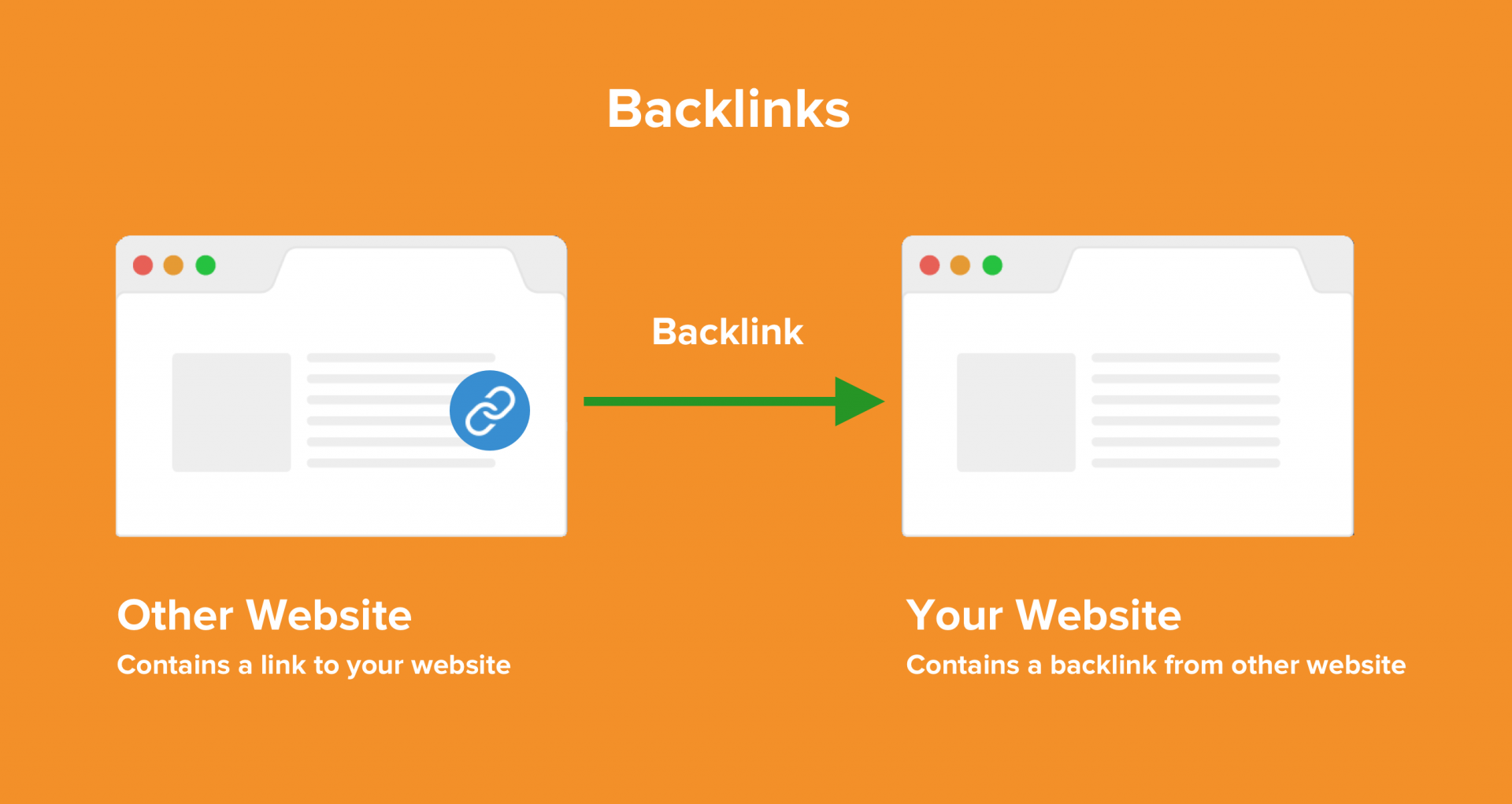
Why is Backlink Building Important for Your Real Estate Website?
First, backlinks are a significant piece of the puzzle of SEO (search engine optimization).
They go together like peanut butter and jelly. You need one to make the other better.
High-level, here are four quick reasons why it’s essential to have a good backlink building strategy:
- Backlinks are how Google finds your pages.
- Backlinks are a way to show Google that you have a solid reputation. Trustworthy websites rank better.
- Relevant backlinks can boost your authority.
- Backlinks drive more traffic to your website.
Here’s an example. When someone types “sell my house in [market city]” or “real estate agent in [market city]” into Google, you want your website to come up on the first page.
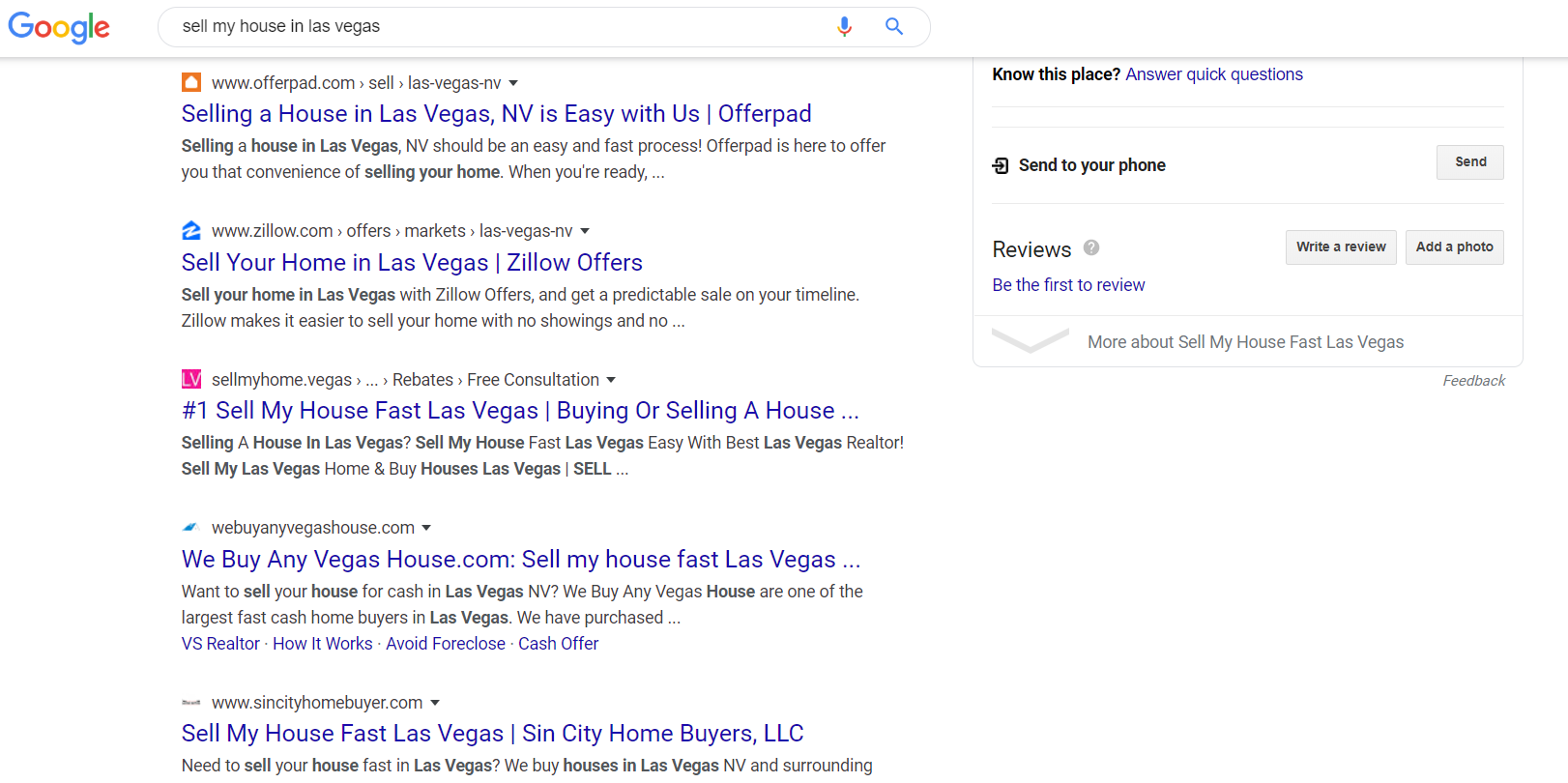
If it doesn’t, you’re missing out on much website traffic, leads, and, more importantly, deals.
93% of internet experiences start with a search engine… which includes the real estate industry. When people — your target market — seek help, they go to Google.
And if you show up on the first page, that’s good for business.
Two of the most potent factors for ranking in Google are website traffic and backlink portfolio.
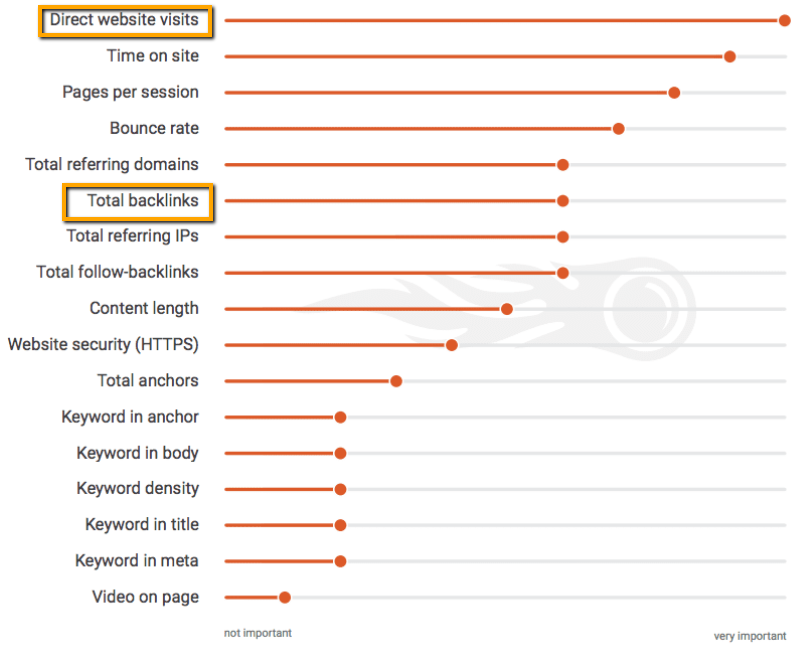
In other words, the more traffic and backlinks a page on your website receives, the better that page will rank for your target keyword phrases.
Here is another example of a Carrot website. This member has 272 backlinks:
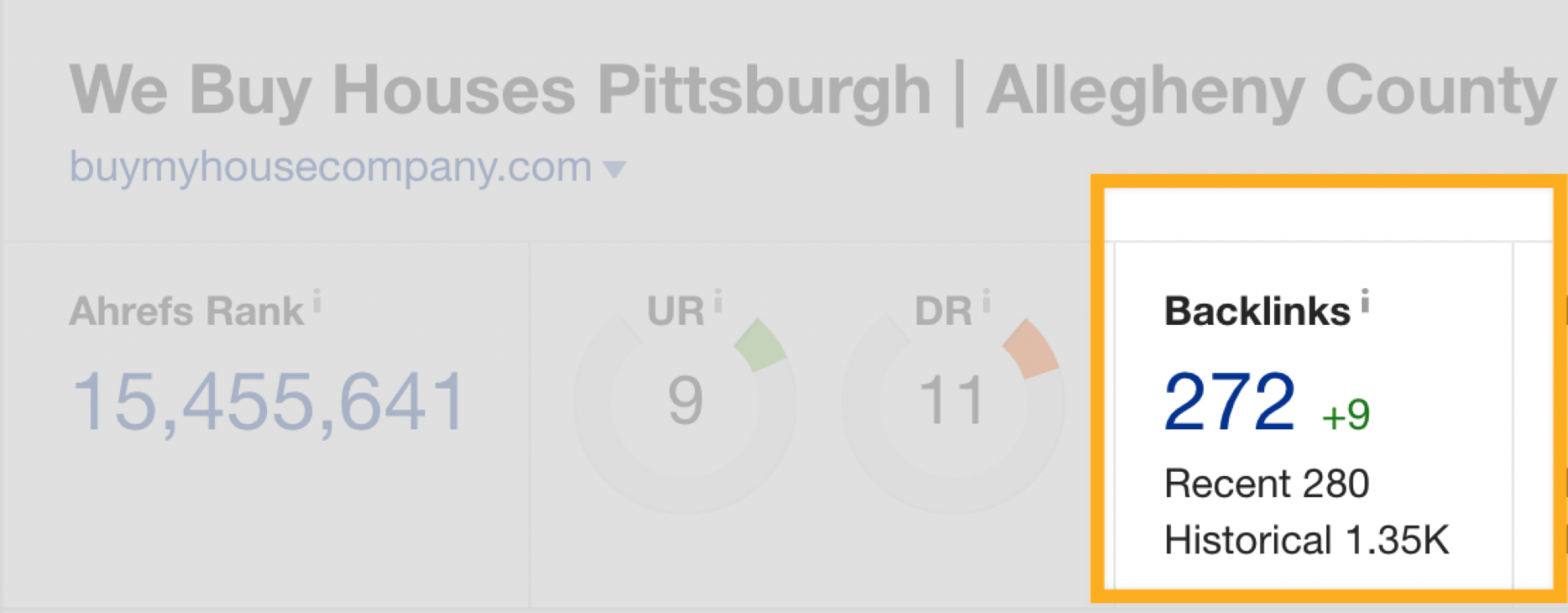
Backlinks have helped it rank to #1 for the target keyword: “we buy houses in Pittsburgh.”
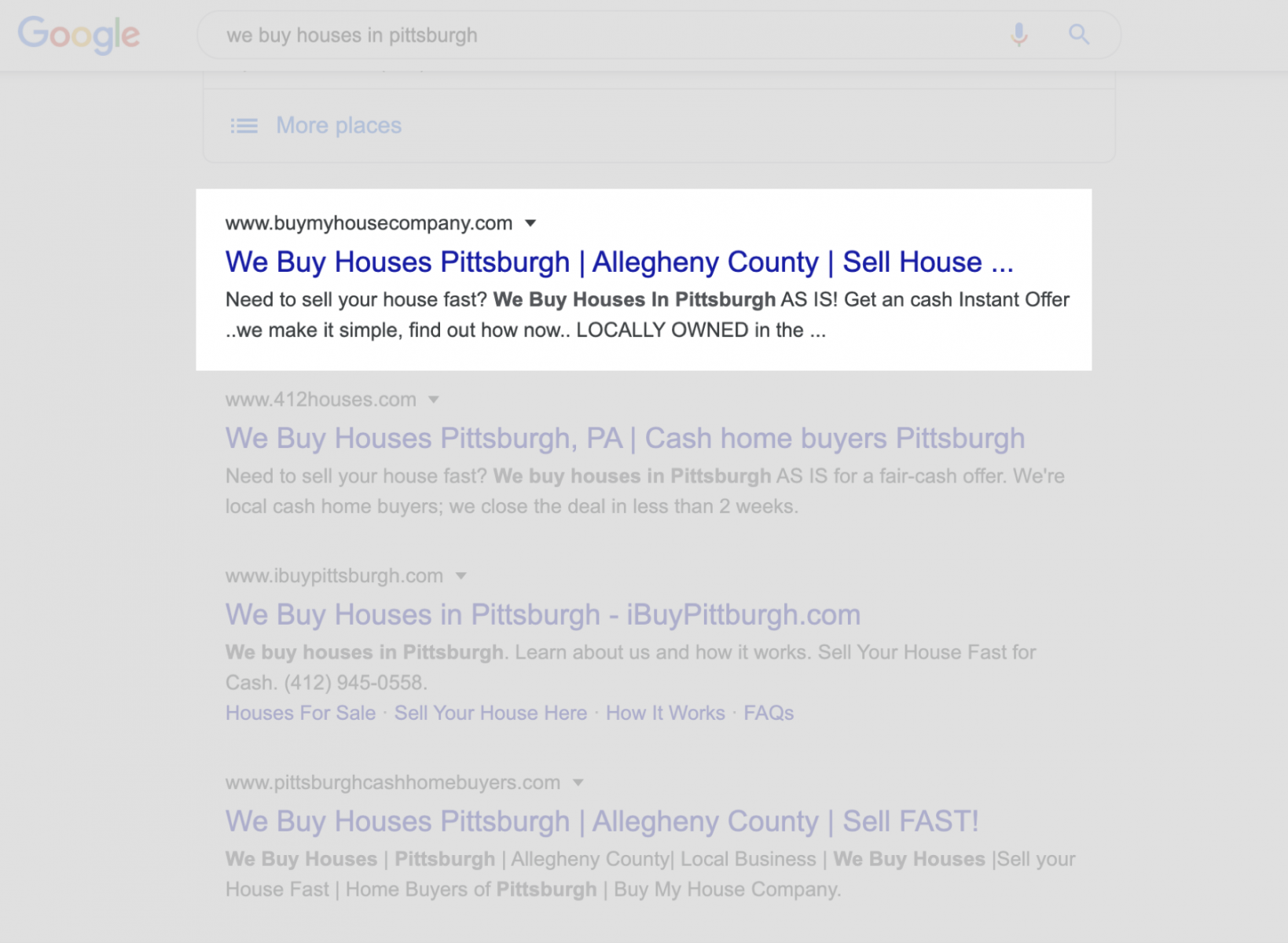
Unfortunately, getting traffic and backlinks are a few of the most challenging things. This is why we’ll give you practical tips for promoting your content and link-building.
Not sure if you have backlinks? Use a free backlink checker tool.
Chapter 5:
Technical SEO
What is Technical SEO?
Technical SEO involves optimizing your website’s technical setup to be easily crawled, indexed and understood. It’s a vital part of any SEO strategy and should be done before you start working on other aspects of SEO, such as keyword research and link building.
7 Technical SEO Optimizations To Consider
Technical SEO is vital because your other SEO efforts will be pointless without the right tech stack.
It’s the foundation.
And here are seven essential optimizations your site needs if it’s going to rank above the competition. Learn more about technical SEO for real estate websites.
1. Page Experience
Google periodically updates its page experience signals. Core Web Vitals combined with existing search signals, including mobile-friendliness, safe browsing, HTTPS security, and intrusive interstitial guidelines.
2. Load Speed
Load speed is important for SEO because if your website is slow, people will leave before they can see your content. Search engines will rank your website lower if your site loads slowly.
You can improve your website’s load speed by optimizing your images, using a caching plugin, and minifying your scripts and CSS.
3. Responsiveness
Responsiveness is important for SEO because more and more people use their mobile devices to search the web. Over 60% of all Google searches are now done on mobile devices.
You can make your website more mobile-friendly by using a responsive design, optimizing images, and suitable font size.
4. Site Security
Site security is important for SEO because it helps protect your website from hackers. If your site is hacked, it could be entirely removed from Google’s index.
The easiest ways to secure your website are getting SSL certification and using a secure web hosting service.
5. Indexability
If search engines can’t crawl your content, you won’t have any chance of ranking. If your site isn’t indexable, you cannot rank it.
You can improve your website’s indexability by using a sitemap, optimizing your robots.txt file, and using the “no index” tag where appropriate.
6. Google Search Console
Google Search Console is a free tool that allows you to see how Google sees your website. It also allows you to submit your website to Google for indexing and gives you information about any crawl errors that Google encounters when trying to index your site.
You can use Google Search Console to improve your website’s technical SEO by fixing any crawl errors and submitting your sitemap to Google.
7. Broken Links
Broken links are bad for SEO because they prevent search engines from crawling your content. If you have a lot of them on your website, it will hurt your chances of ranking.
You can fix these by deleting them or pointing them to the correct page.
How do Carrot Sites Stack Up?
That all makes sense.
But you might wonder how Carrot’s websites stack up to these requirements.
In short, it went very well.
Because we care about your site’s performance. :)
Our sites are responsive, have record-setting load speeds (see the image below), and come with SSL certification.
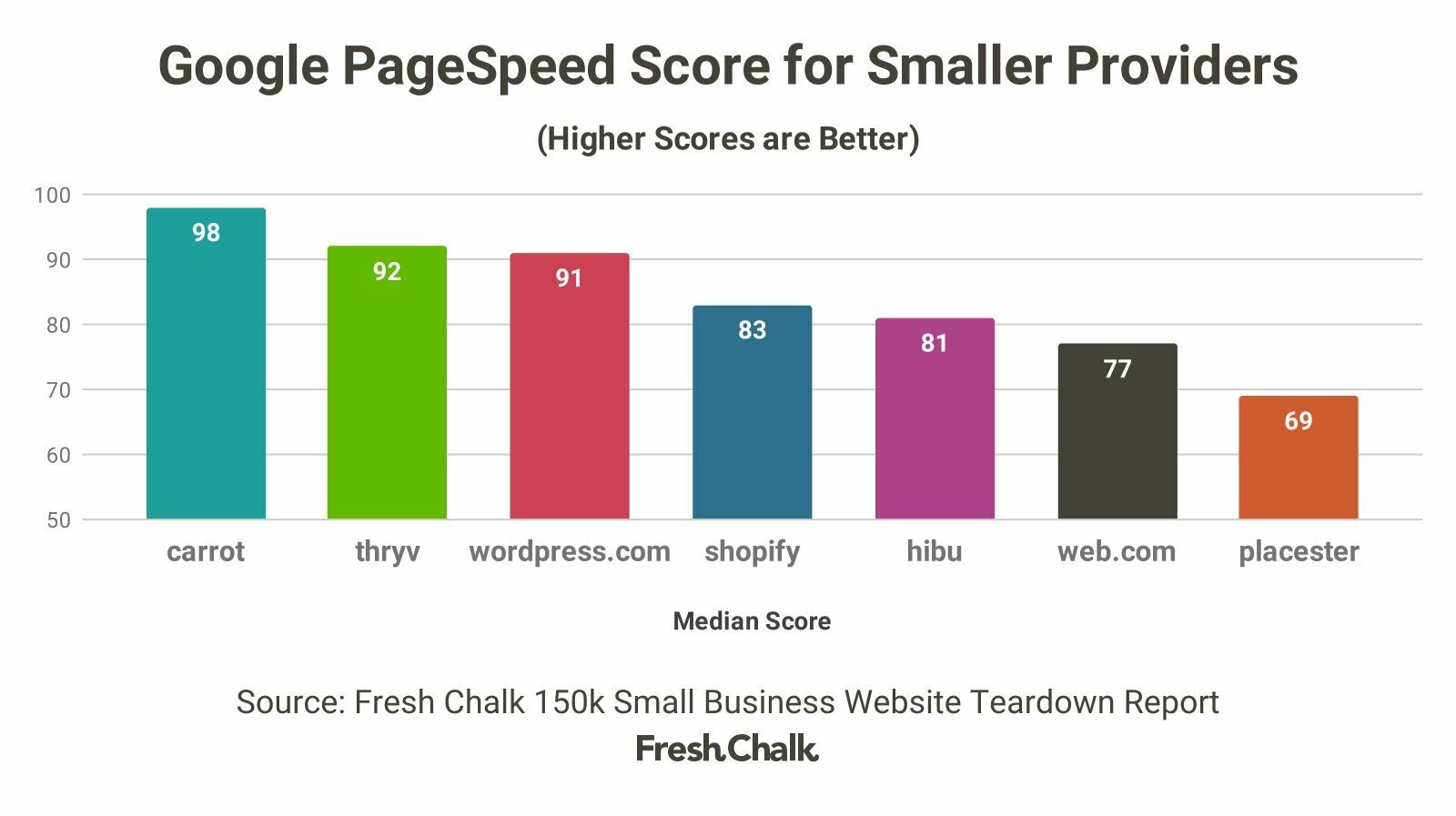
We’re constantly improving our website’s tech stack to give our members better results. Try us risk-free for 30 days by clicking here!
Technical SEO may seem daunting, but it’s essential for any real estate website that wants to rank well.
Chapter 6:
Video SEO – Optimizing YouTube for Real Estate
What is Video SEO?
Video SEO is… well, search engine optimization for your YouTube videos rather than written content or images.
But how do you optimize your video content, especially considering that search engine bots can’t watch your video to learn what it’s about (they can only read text)?
Why should you care about video SEO for your real estate website?
Why Should You Incorporate YouTube Videos into the Marketing Mix?
Usually, search engine optimization involves writing articles on your website’s blog that target specific keyword phrases or adjusting your homepage copy to target a specific keyword phrase.
And that illustrates the first benefit of video SEO — it takes much less time than written content.
Would you rather spend several hours trying to write the perfect blog article or record a 10-minute video on your phone? Yeah, it’s way easier.
But video SEO isn’t just more manageable. In some regards, it’s also more exciting and attractive to your target market. Consider that:
- 54% of consumers want more video content from the brands they love.
- 88% of video marketers are satisfied with their ROI on social media.
- 76% of marketers say that video helped them improve website traffic.
- 80% of marketers say that video has increased people’s time on their websites.
People love videos. It allows them to connect with your brand in a way that written content doesn’t and is easy to consume.
With video SEO, you can consistently drive traffic to your website, generate leads, do more deals, and build a more authentic relationship with your target market.
How To Optimize Your Real Estate YouTube Videos
1. Use Video Transcription
As we’ve discussed, search engine crawlers (the robots that search engines use to determine what content is about) can’t read videos.
It means that if you record and post a video without a title, description, or transcription, that video isn’t going to rank (it might not even get indexed) because there are no words for the robots to read.
That’s why transcription is an absolute must — without it, your videos have a much lower chance of ranking. With it, Google can read the words, attribute them to the video, and rank that page and/or video for your target keyword phrase.
The only problem is that you don’t want to spend several hours writing a transcription for each of your videos…
That’s why, at Carrot, we created VideoPost, which allows Carrot members to upload a video and then create a transcription with the click of a button. Here’s what that looks like…
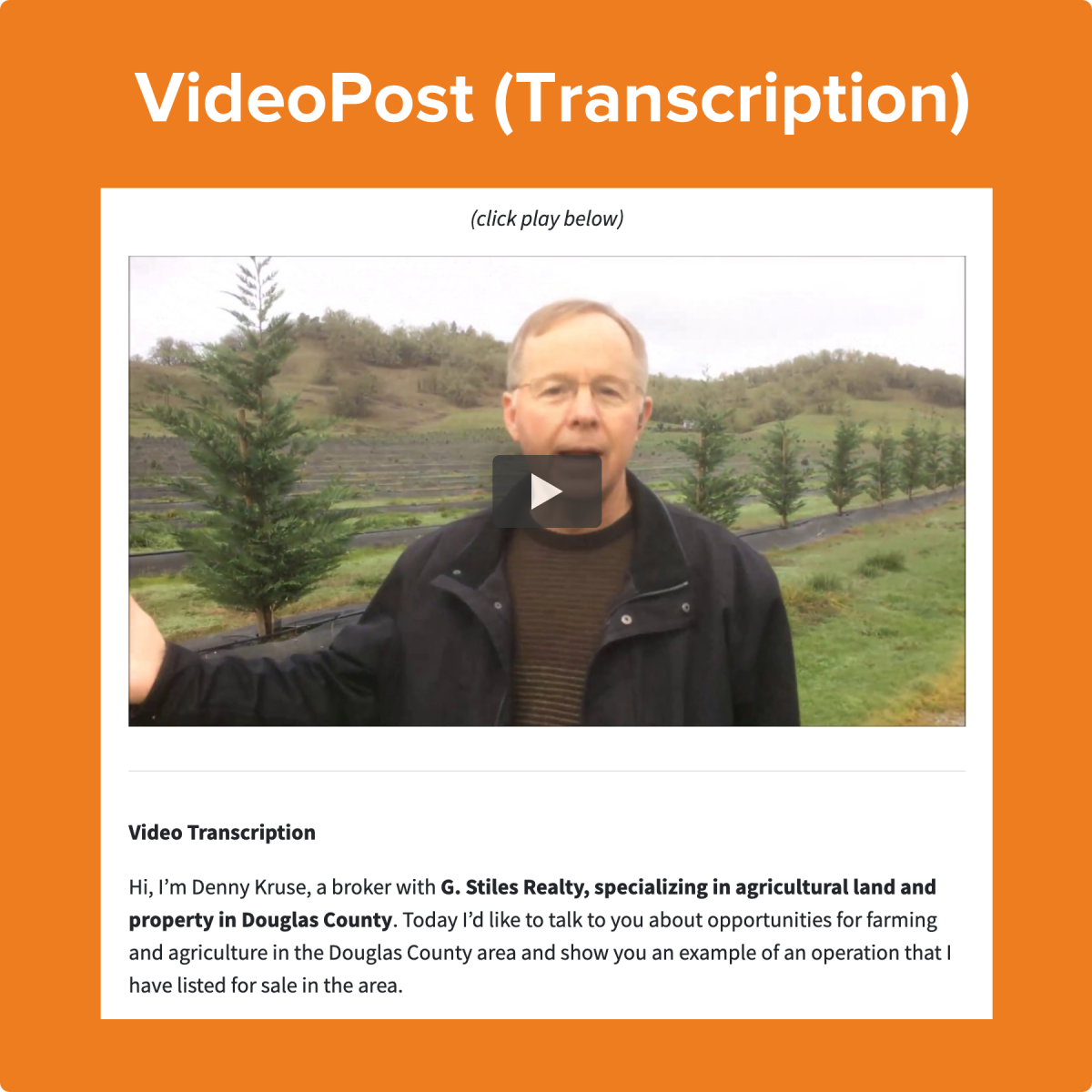
Action Item: Add a transcription below your videos. You can do this by becoming a Carrot member and using VideoPost.
2. Create an Engaging Thumbnail
Thumbnails are one of the most important elements for getting more clicks and engagement (which, in turn, means better rankings — the more people click, the more that Google wants to show your content).
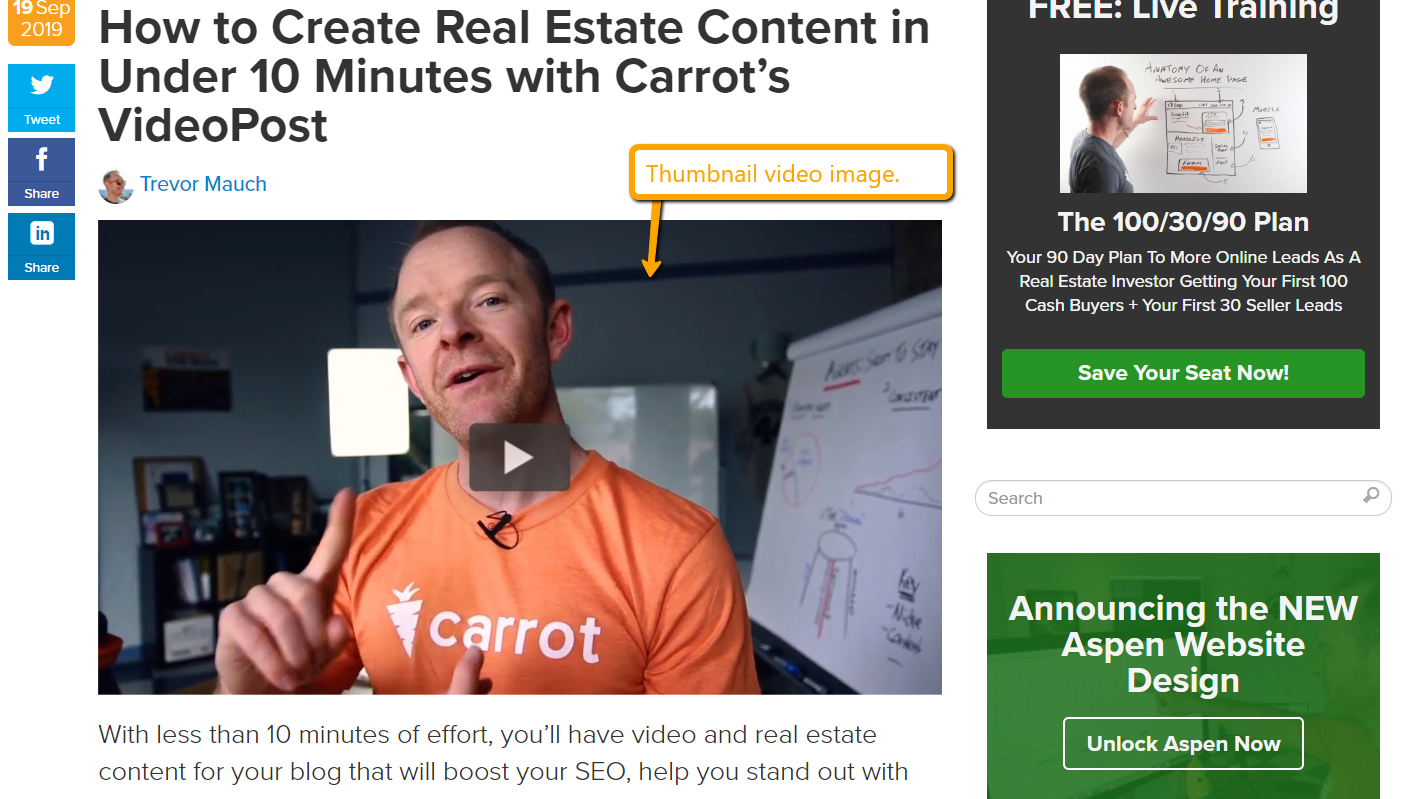
When people see it, it helps them determine whether they’ll watch your video. If your thumbnail is attractive and enticing, more people will click — and when more people click, Google increases your rankings.
Here are a few examples of great video thumbnails…

Real estate expert, Max Maxwell, is particularly good at publishing eye-catching thumbnails.
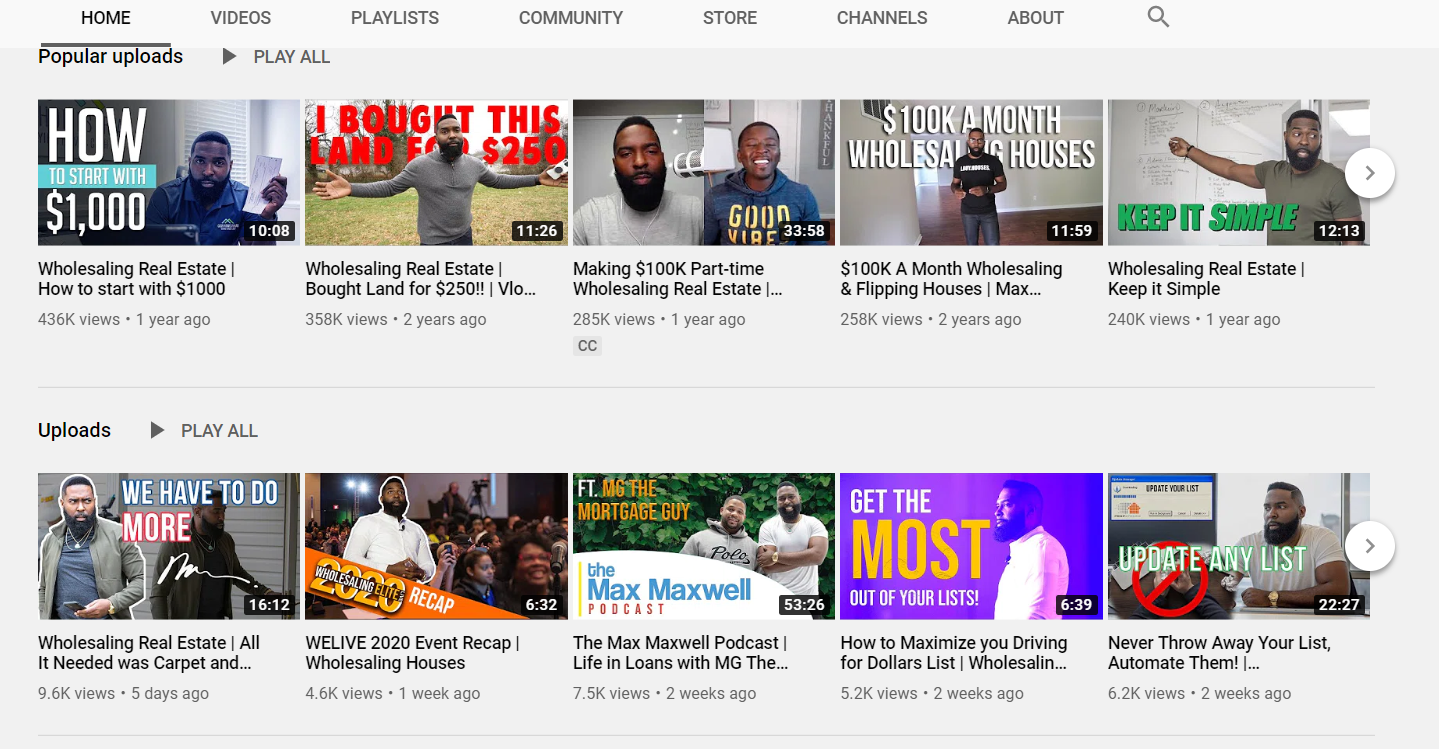
Action Item: Spend a little more time on your video thumbnails. Ask yourself, “What will catch my target market’s attention and make clicking irresistible?”
3. Pay Special Attention To Your Video Title
As with all content — blog posts, podcasts, and videos — the title matters twice as much as everything else.
People might look at your thumbnail because it’s visual and exciting, but they’ll look at your title next to determine what your video is about and, more importantly, if it interests them.
So, develop a title to entice your target market to click and watch. Remember, the more engagement your video gets, the better it will rank.
Here are a few practical tips for writing enticing headlines
- Be specific.
- Ex: 10 Tips For Selling Your House During Probate
- Focus on attracting your target market.
- Ex: How to Sell Your House in Just 2 Weeks!
- Don’t be afraid of a bit of controversy.
- Ex: Why You Should Skip The Real Estate Agent
- Create urgency.
- Ex: Watch THIS Before Choosing a Real Estate Agent!
- Offer a certain number of tips, tactics, or strategies.
- Ex: 10 Hacks For Getting Top-Dollar On Your Home
Action Item: Create an irresistible headline using the tips above. When more people watch your video, your rankings increase.
4. Optimize Your Video’s Description
Your video description is one of the primary places that search engine bots look when determining what your video is about, so make sure to include your target keyword phrase a couple of times.
If you created a video titled “Sell My House Fast Pittsburgh PA,” you might have a video description that looks like this (notice that I include the target keyword phrase near the beginning of the description.

“Wondering “how to sell my house fast for cash?” We are local HOME BUYERS with cash in Pittsburgh.”
Action Item: Include your target keyword phrase within your video description at least once and no more than twice.
5. Optimize Alt Text On Images
When you transcribe your video into a long-form blog post, you might want to space that content with images or screenshots from your video.
We do this in a lot of our whiteboard video posts!
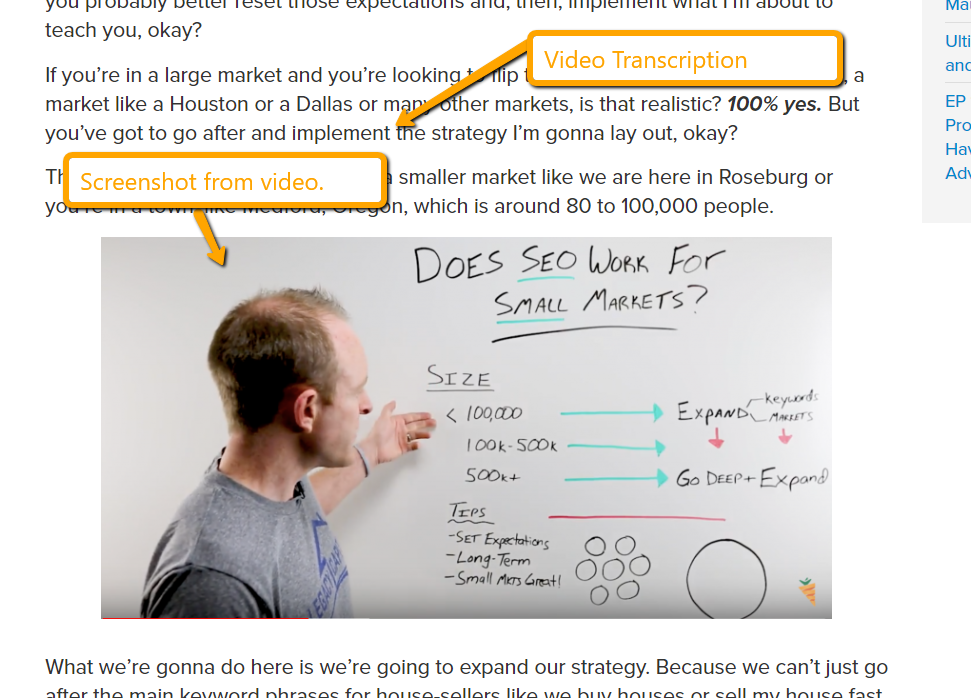
Action Item: Add alt text to your images and use your target keyword phrase within that alt-text when possible!
Chapter 7:
SEO Keyword Tracking Tools: Optimize Your Real Estate Website Rankings
There’s no point in producing content and hoping that it works. You need data to give you feedback and help you improve over time.
You can make more educated decisions about your SEO campaign by tracking your keywords and making strategic changes to your content based on the data you receive from keyword ranking tools.
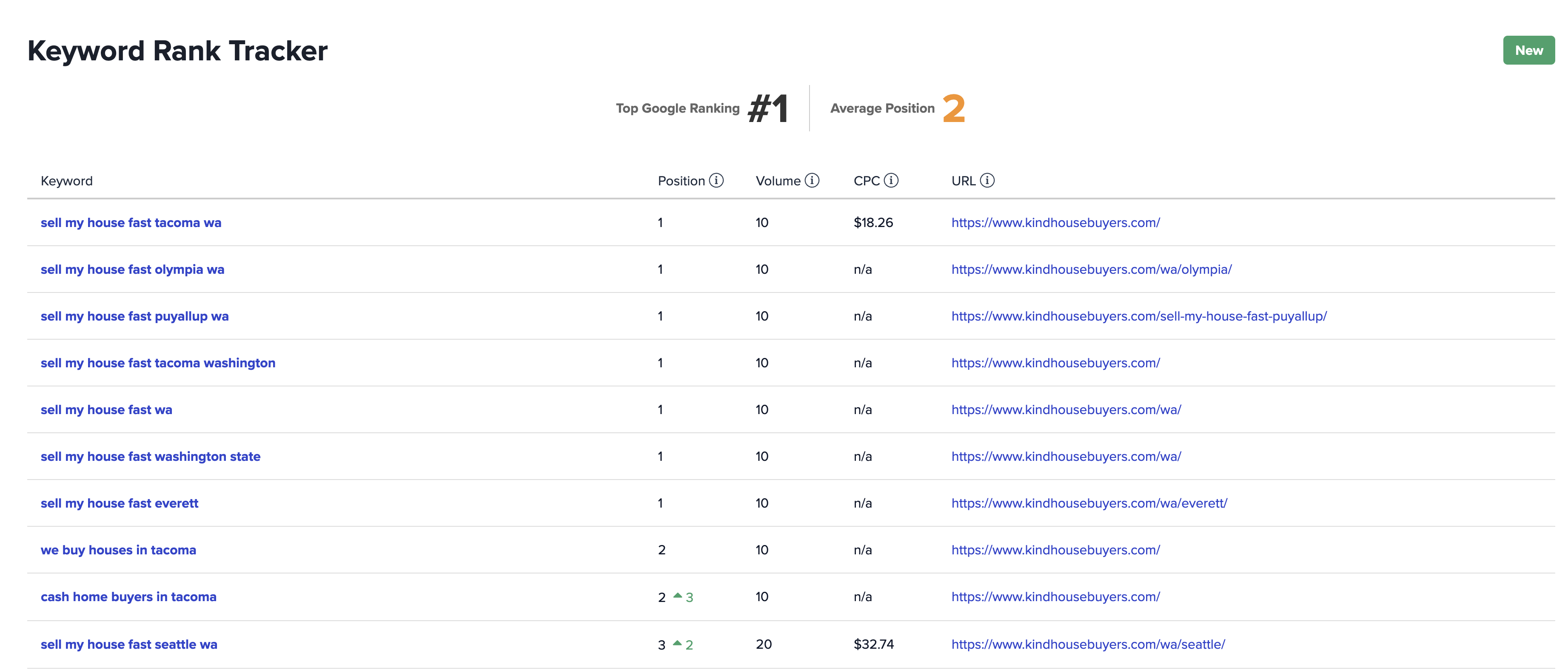
What is Rank Tracking?
Keyword trackers check the rank positions of your content in Google’s SERPs. These keywords include the following types:
- Keywords that are used on your website.
- Other keyword terms you haven’t optimized.
- Keywords that your competition ranks for.
Keyword tracking is about analyzing the organic positions of keywords over time. It’s based on current rankings and historical data so that you can analyze your organic traffic’s progress and impact.
The Importance of Tracking Your Keyword Rankings
Keyword tracking is an essential part of the real estate SEO workflow. Tracking will give you information to take actionable steps to improve your website traffic and increase lead generation. Keyword rankings remain one of the most important KPIs in SEO.
But don’t focus only on the positions. You must understand how the keyword positions influence your overall organic traffic potential. Not all keywords have the same traffic volume. It’s a good idea to include long-tail keywords and try to rank for more competitive terms.
You can also find “low hanging fruit”:
- Keywords ranking on page two
- Competition keywords
- Keywords ranking 4-10
Look to see if you’re ranking on page two for any keywords. Then, add some content, internal linking, and optimize the existing content to boost page one.
Also, track your competition. Keep an eye on the keywords your competition is using when you’re tracking keywords. Stay ahead of them by producing strong content that sets yours apart from theirs.
Your keyword ranking answers will lie using some of the tools mentioned below. They can make keyword tracking dead simple.
So here are four SEO keyword ranking tools you will want to use.
Tools to Check Your Keyword Rankings
1) SEMrush (Limited Free Plan. Paid for Full Service)
SEMRush calls its keyword tracking “Position Tracking.” Their tool allows you to track your website’s ranking for target keywords in Google’s top 100 organic and paid results. You can receive daily updated data showing how your optimization efforts help your keyword rankings progress over time.
You can also track your competitors’ keyword rankings using a side-by-side comparison of your rankings versus others and highlighting the keywords you need to focus on.
2) Ahrefs (Paid Service)
Ahrefs is more than just a keyword ranking tool. But, if that’s all you need, its keyword rank checker tool allows you to see your keyword rankings and any website of your competitors. They also break down desktop and mobile rankings for your target keywords.
3) SmallSEOTools Rank Checker (Free)
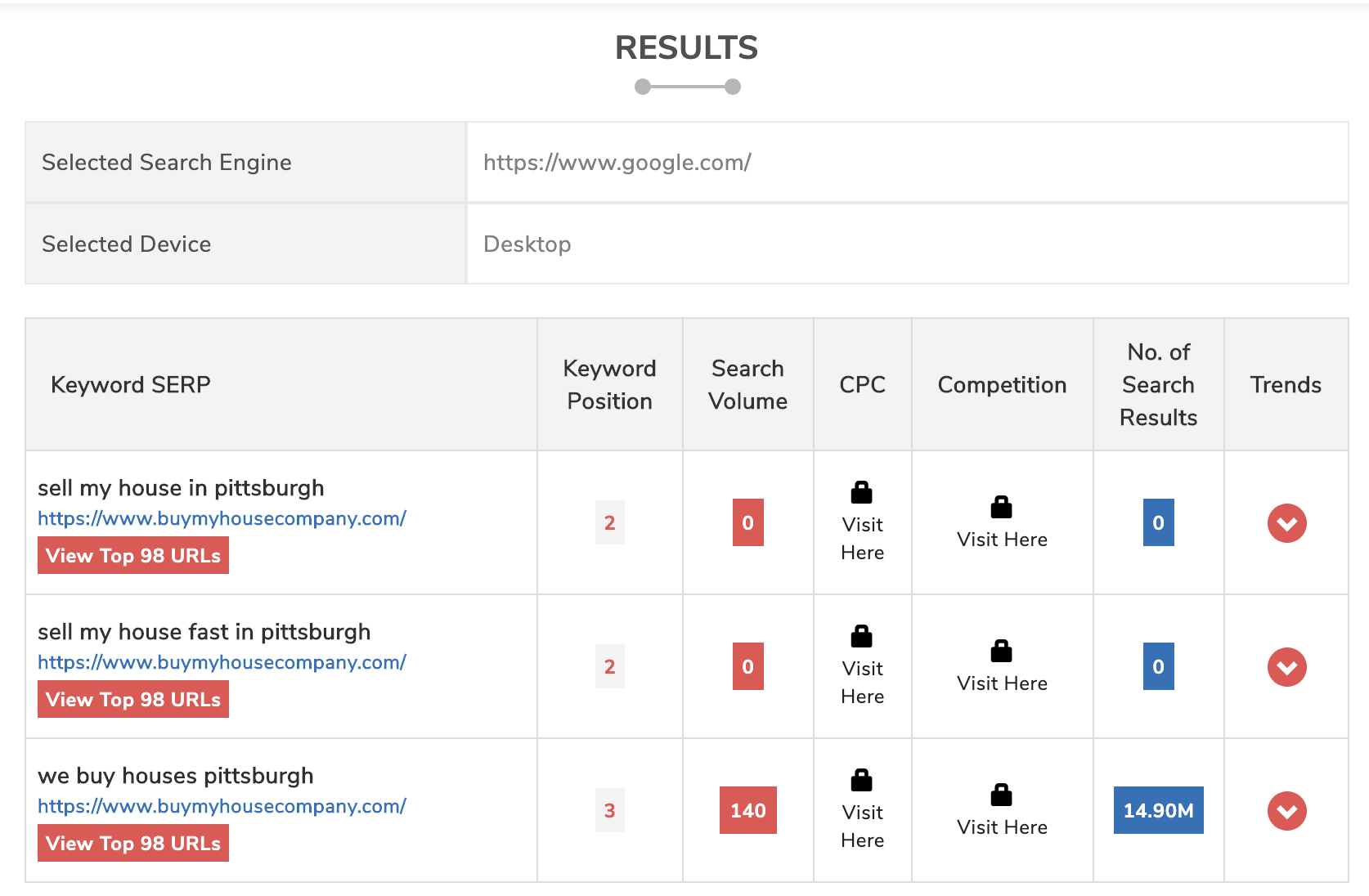
If you’re looking for a “simple” way to track your real estate keyword rankings, SmallSEOTools rank checker might be for you. As you can see from the image above, you can check your rankings based on the keywords of your choice. You can toggle between desktop, tablet, and mobile devices and download your rankings in spreadsheet format.
4) Carrot Keyword Ranking Tracker (For Carrot Members)
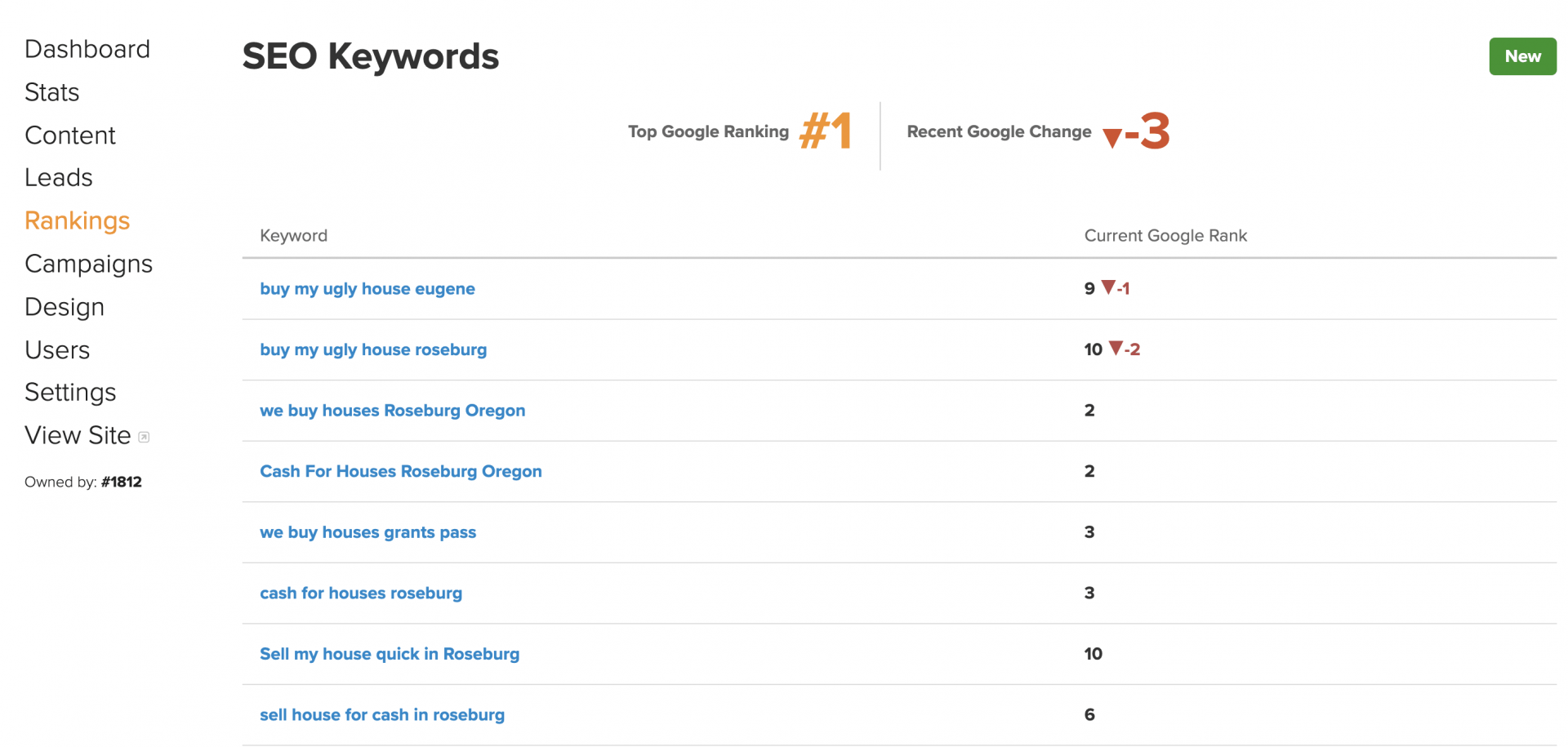
Imagine that you’re writing content every week, publishing it, and optimizing it to rank for some seriously high-value keyword phrases.
Then imagine you start seeing organic traffic to your website — Woo-hoo!
But imagine that you don’t know where that traffic is coming from because you cannot track your rankings. You don’t know which pages are ranking or what phrases they’re ranking for, and because of that, you can’t replicate your results.
It would be self-defeating, huh?
That’s why we created the SEO keyword ranking tracker at Carrot. All you have to do is enter the keyword phrases you’re trying to rank for, and we’ll automatically track your results for you; check your dashboard when you’re wondering how your SEO for real estate efforts are paying off.
Keyword Tracking Best Practices
To get the most out of keyword rankings, you must understand that ranking #1 for each keyword should not be your only priority.
If you obsessively track your keyword rankings, you’ll lose time that can be invested in actually improving your positions.
Keyword tracking aims to check the overall progress of keyword positions and their impact on your organic traffic.
Sometimes, your keywords ranking in the highest positions will bring less quality organic traffic than the other five keywords for which the website ranks towards the middle of the first page. Conversely, a drop in one of your most important keywords can be more critical than a significant increase in other keywords.
To know this, you must keep records of your changes and picture the potential traffic. Using one of the tools above allows you to keep clear records. Or, create your spreadsheet and keep track of your movements.
Chapter 8:
High-Level SEO Strategy for Real Estate Websites
You’ve made it this far, so let’s recap. But before we dive in… Here’s a quick example of the results you can achieve by having a solid SEO for a real estate strategy…
This Carrot member has followed the plan.
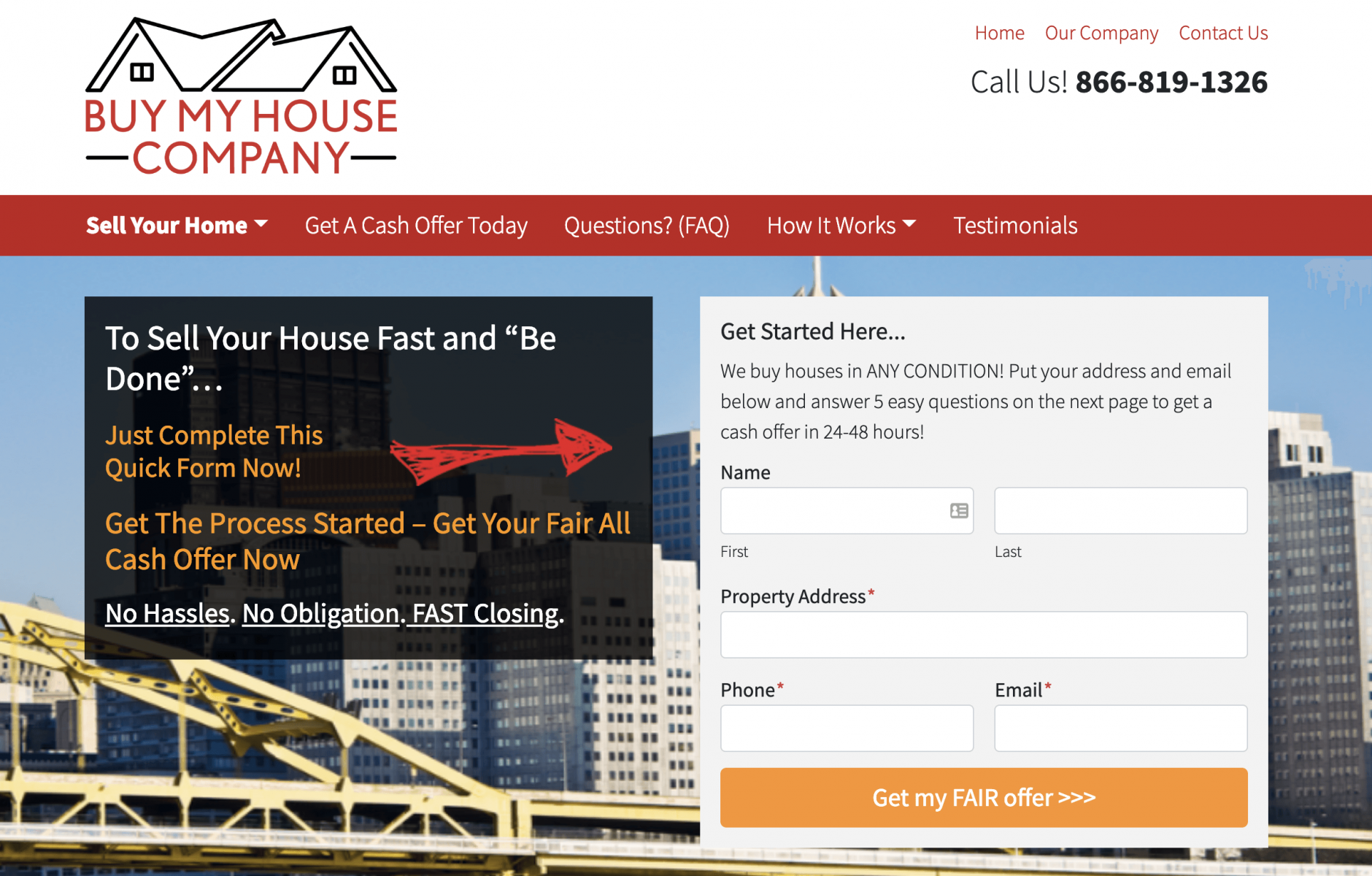
They’ve risen through the SEO ranking and now rank #2 (at times #1) for two competitive search terms

And therefore, they have 1000’s organic leads in their Carrot dashboard
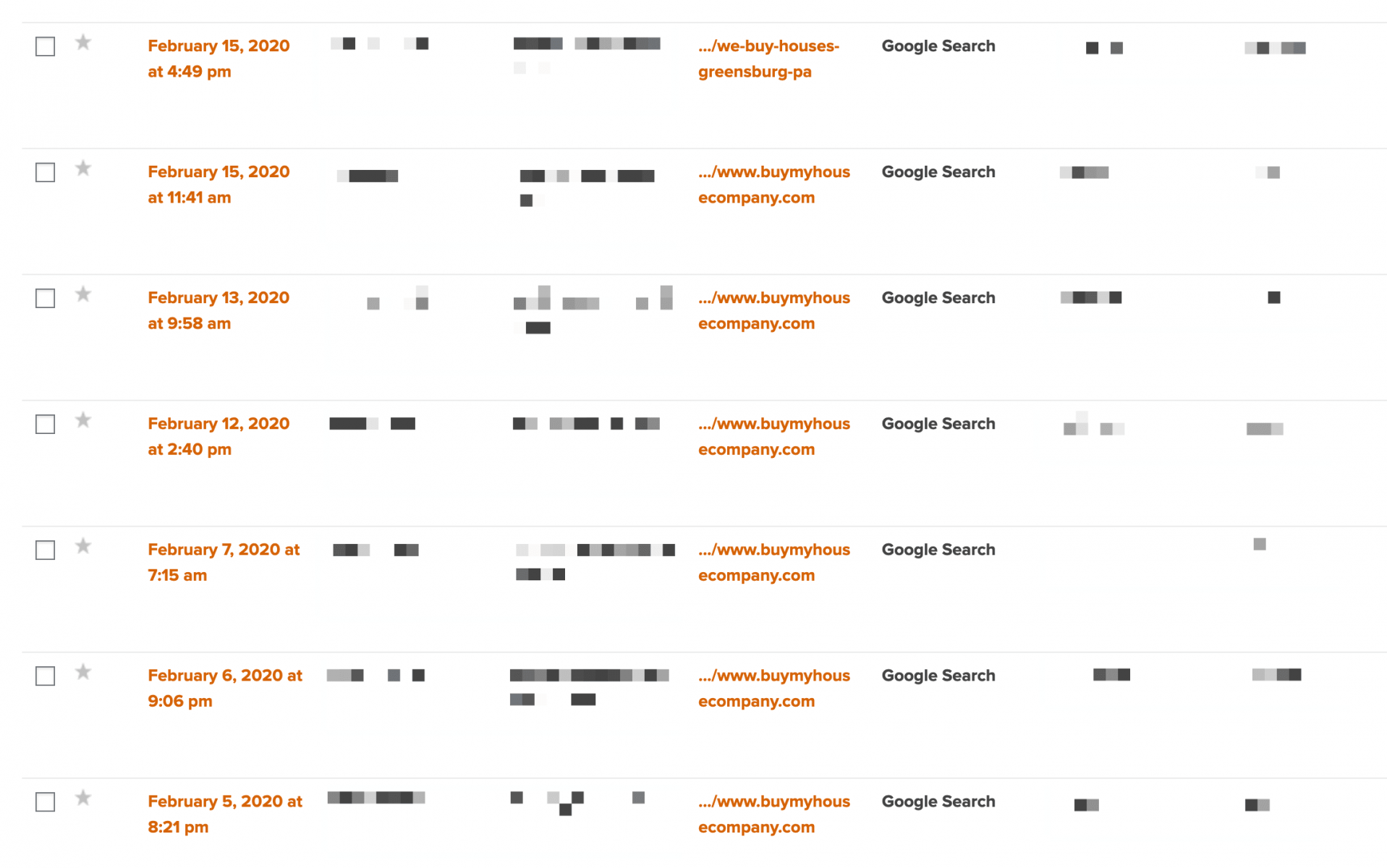
When SEO is taken seriously, you can see that you can be successful with a good plan!
1. Choose a Website Builder That’ll Get The Tech Stack Right
The first thing you need is a real estate website builder that isn’t going to sabotage your SEO efforts down the road. If you use a website builder (or website hosting, for that matter) that has slow load times, a clunky experience, or isn’t mobile-friendly, that choice can hurt your rankings.
Regardless of how hard you work to rank for keyword phrases, you need a website that supports you.
These are important for Google, which means they are important for your SEO rankings.
Our websites are fast. In a study of 150,000 websites, Carrot’s tech stack outperformed Wix, Squarespace, WordPress, plus many others. Only Google’s platform beat us.
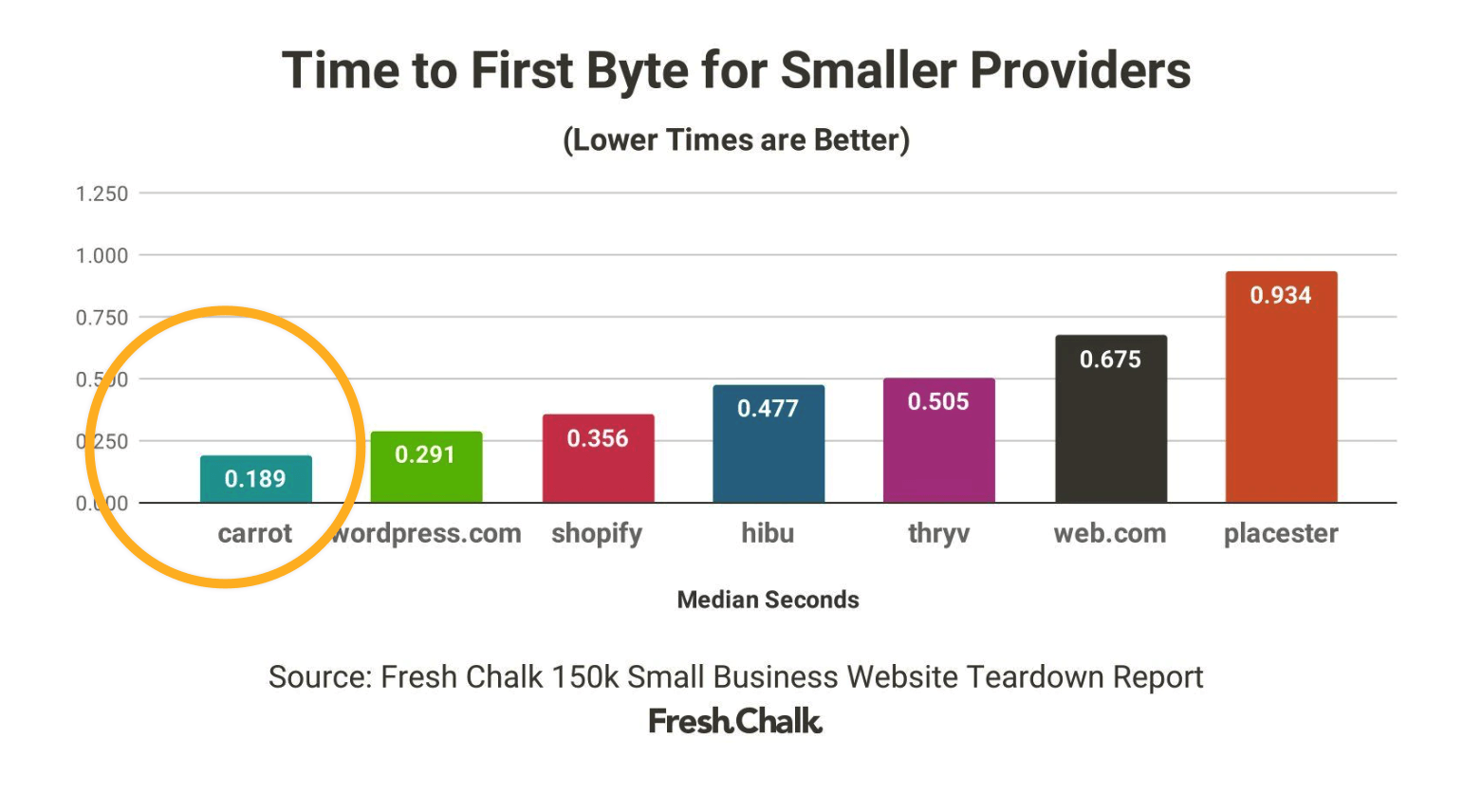
Check your website speed using resources such as:
The website builder you choose must be ready to support your SEO efforts with speed, mobile-friendliness, and a clean user experience. Otherwise, you’ll be fighting an uphill battle.
2. Optimize For Conversions
What is the point of getting people to visit your website if you don’t generate any or very few leads?
That’s why, before diving too far into optimizing your website to rank for traffic-driving keyword phrases, you should make sure that your website will convert at least 5% of visitors into leads and ideally 10% or more.
But how do you know if your website converts as many leads as possible?
The long way around is creating a website, driving paid traffic, and tracking conversions. Are you getting at least 10% of people to give you their contact information?
Or (the easier method) is to get yourself a Carrot site that’s pre-tested and proven to convert higher than any other website template in the industry.
We’ve got your back with support and free content whenever you need it, and you’re guaranteed to start with a site that converts.
3. Create a Google Business Profile
Local real estate SEO is much easier to tackle than nationwide SEO.
At Carrot, for example, we must compete for really saturated keyword phrases like “real estate website builder” or “how to build a real estate website.”
Lots of software companies around the nation are trying to rank for those keywords, which makes our job even harder.
(But that’s okay — we’re up for it)
The good news is that unless you’re managing a nationwide real estate business (which you’re probably not), you don’t have to compete for those crazy keywords.
The keywords you want to compete for will be localized to your specific city or state.
Do you know the easiest and fastest way to jump to the top of the SERP for phrases like “home buyers in ” in your market?
Create a Google Business account.
This is free and will allow your business to be listed and found under highly relevant search phrases.
Here’s what that looks like in action…
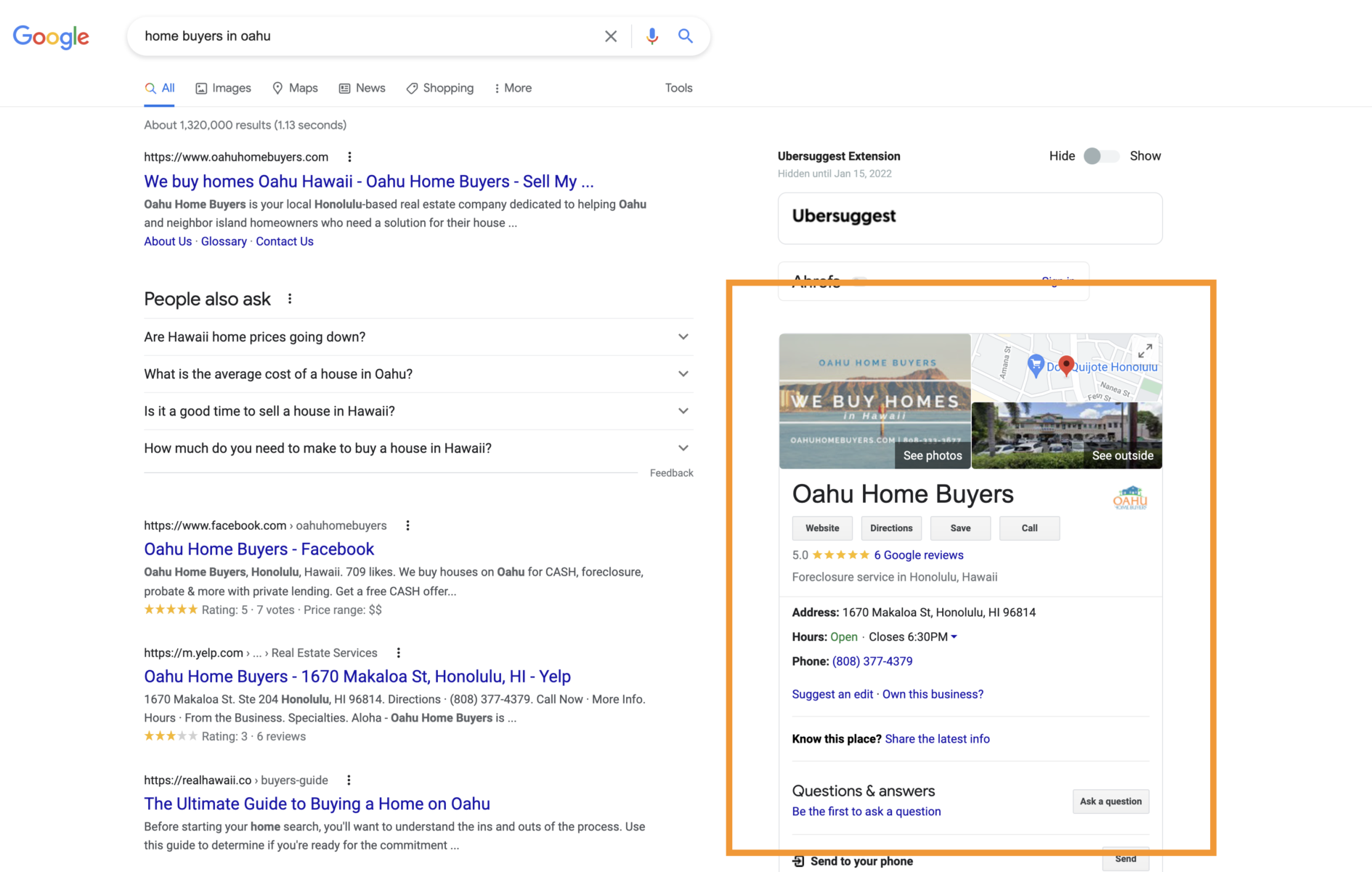
That’s a lot of visibility!
But how do you snag a top spot with your Google Business account like that? Here are some best practices to keep in mind.
Complete Every Section
Some sections that Google wants you to fill out when listing your business might not feel important or relevant, but filling out as many as possible is essential.
Google will treat your listing better if you’re thorough.
So make sure you fill out the following:
- Name
- Address
- Phone
- Website
- Hours
- Category and Attributes
- Products and services
- From the business
- Questions and answers (Owner-generated queries)
And keep these as updated and current as possible:
- Posts
- Reviews
- Questions and answers (Consumer-generated)
Be Consistent
To ensure your business listing is legit, Google will crawl other websites to see if your information is consistent across all sources.
So make sure your name, address, phone number, and other information are identical across all the websites where your business is listed.
Optimize the “From The Business” Section
In the “From The Business” section of your Google Business listing, take the time to talk about your business and what it does.
Sell your business to readers. Use all 750 characters, repurpose some content from your About page, and use keywords your audience will use when searching in Google.
Collect Reviews
The more positive reviews you have on Google, the higher that Google will rank you.
So collect Google reviews whenever possible from friends and family, past clients, and happy clients you’re currently working with.
4. Choose 3-5 Keyword High-Value Keywords
Once you’ve got a site with an SEO-friendly tech stack and a high conversion rate, it’s time to get to work.
But don’t overwhelm yourself — start with just 3-5 keywords or phrases that are high value. If you operate in multiple markets, you could target the phrase, “Sell my house fast in [MARKET CITY],” and create a separate page for each market where you operate.
If you operate in one market, then definitely still create a page that’s gunning for “Sell my house fast in [MARKET CITY],” but you might also try to target phrases like “How to sell my house for cash in [MARKET CITY].”
If you’re a real estate agent, then consider targeting phrases like “Best real estate agent in [MARKET CITY]” or “Real estate agents in [MARKET CITY].”
Don’t choose more than 5 keywords for now, though, because you’ll have to create content for each search phrase, and you want to start simple. This is your SEO foundation.
5. Create Optimized Content For Each Of Your Chosen Keywords
It’s time to create a separate page or content for each keyword phrase you’ve chosen.
Include your target keyword phrase within your page’s title, meta description, and URL slug. You can use the Carrot’s on-page SEO analysis tool to determine whether you’ve optimized the page.
This will be the most time-consuming part of the process, but this is where the magic happens, so make sure you check off as many of the SEO to-dos as possible.
6. Monitor the Results
Once you’ve created pages for your target keyword phrases, monitoring your results is critical.
But how do you do that?
The easiest way is to sign up for our SEO and Content Tools, which will provide you with a high-converting website and the ability to track your choice of keyword phrases (plus tons of other goodies).
Just go to your dashboard, click “Rankings” on the left side of the page, and add a new keyword. We’ll automatically provide you with any updates in your website’s rankings regarding that keyword phrase.
Easy as pie.
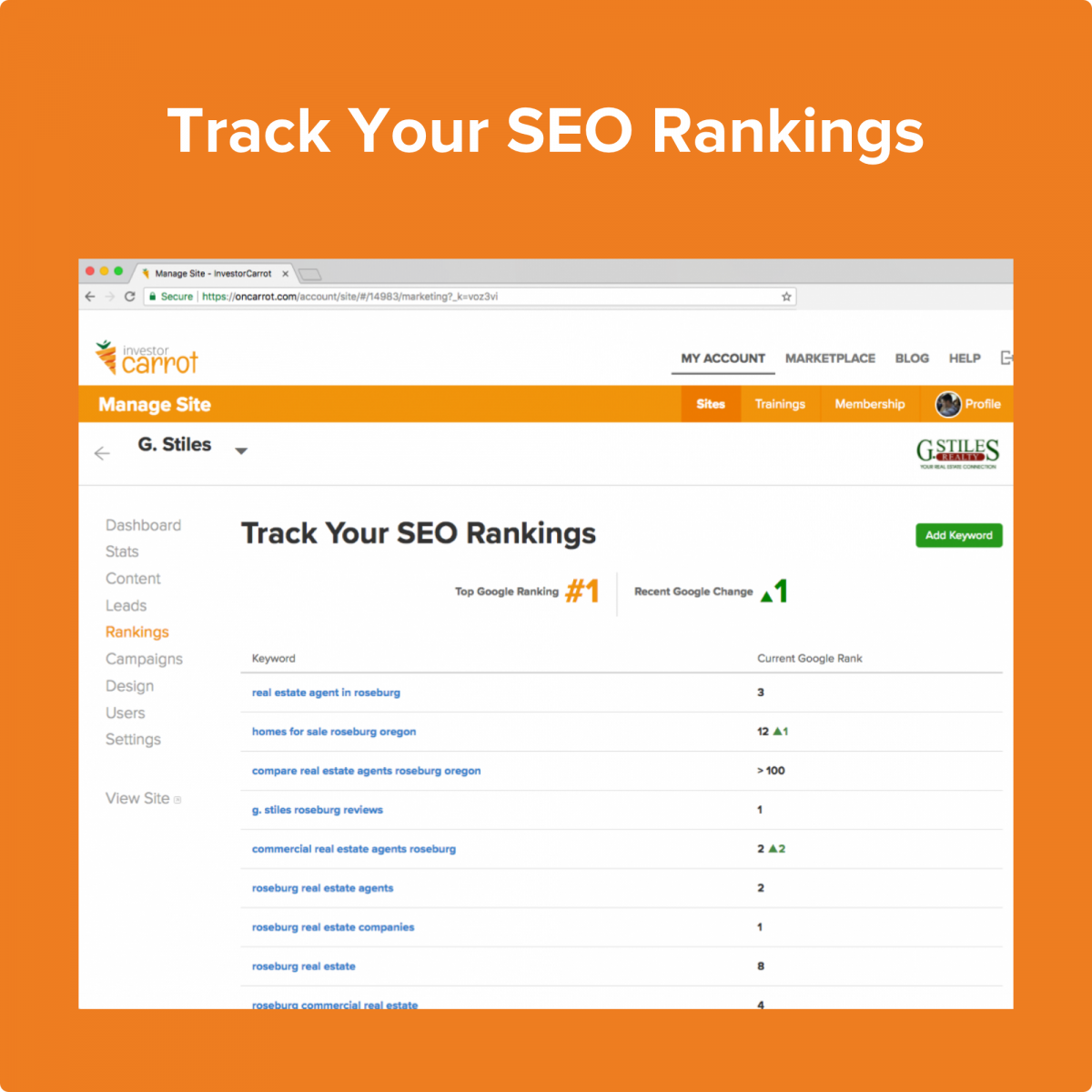
7. Build Links If Necessary
Unless you KNOW that the keywords you’re targeting are highly competitive and you won’t be able to rank without link-building, I will wait to see how each new page performs before spending time or money to earn backlinks.
Give your new pages at least a month before building links to see where each lands in the SERP.
Are you on Page 1 already? Great! Then there’s probably no need to build backlinks (unless you want to crawl further up the page). Are you on Pages 2, 3, or 4 after a month? Then, you might want to consider building some backlinks to the page.
8. Rinse and Repeat
There’s your high-level plan!
Ultimately, the goal is to find high-value keywords, create pages or content for each phrase, watch results, and then make changes as necessary.
But remember, time is one of the most significant factors. The more time a page exists, the better its chance of ranking in Google. So be patient and give each new page at least a month to see where it settles before spending more time and money to re-work or re-optimize it.
As you invest in SEO, you’ll learn what works, what doesn’t, and what keyword phrases are the most valuable for your business.
What To Do If You’re Not Ranking Like You Thought You Would
You do the work but still can’t reach page 1, where all the traffic happens. What gives?
Here are some questions worth asking (and the actions you should take) if you’re not getting results.
- Is your tech stack optimized? Typically, this means having a site that loads within 3 seconds or less and having a website with clean code. All Carrot sites are automatically optimized to rank.
- Are the keywords too competitive? If your website is brand new and you’re trying to rank for high-competition keywords, you will struggle to get results. Try to focus on long-tail keyword phrases to begin with. The less competitive, the faster you will see results.
- Is your content the best it could be? Are there any questions you don’t address that other page 1 results do? Is your content longer or shorter than the page 1 results? How can you make the content more helpful and unique and make Google want to rank it higher?
- What other actions could you take to rank the page? If everything else is done excellently, but you’re still not getting rankings, chances are you need to earn some backlinks.
Now you know the high-level SEO for real estate process for ranking your website from A to Z. Get your website’s technical SEO dialed, choose keywords, create content, monitor results, and adapt as needed.
Then give it time!
Want To Build a Bigger, More Sustainable Real Estate Business?
You got into the real estate business so you wouldn’t have to work for “the man,” so you could work where you want, when you want, and spend more time doing the things that matter.
Building a successful long-term business without consistent and predictable lead flow and income is almost impossible. You must know you will make monthly money to support yourself and your family. You need to count on your business, not just hope that deals or transactions come in.
Real estate SEO is your ticket to building a more significant, sustainable business.